A week-long itinerary across Kyrgyzstan brought us to the shores of two very different lakes. One, the Issyk-Kul, is a gentle and vast sea where families spend their summers and Russian pop music blasts from the cafes on the beach. The other, Song-Kol, perched within a crown of towering mountain peaks, is a shy and grumpy lake where (legend has it) it rains at least once a day.
But most importantly, we decided to get around Kyrgyzstan with no car of our own. This meant we fully relied on however willing Kyrgyz people were to share their country with us.
And they welcomed us with open arms and hearts.
Life on the Issyk-Kul
The plane lands before daybreak, despite the three-hour delay. Europe is thousands of miles away, beyond the steppe, beyond the Urals.
Our hotel is supposed to send a driver to pick us up. The thought stresses me out — is he going to show up? Is it going to be an official taxi? I laugh now as I type out of these concerns. I knew nothing of Kyrgyzstan. Sure, I had looked at its crinkled shape on the map, a small presence squeezed between China and Kazakhstan. But I had no idea what it would mean to be here, breathing this air, a few som in my pockets, and no internet connection on my phone.
It is a perfect summer morning and there is indeed a driver waiting for us outside of the Manas airport. He is a middle-aged man and doesn’t speak a word of English. His ride is a van with right-hand drive and a shattered windshield.
As we head out of Bishkek, we take an eager look out of the window.
The air hitting our sleepy faces carries a very peculiar smell, a smell I would learn to identify as quintessentially Kyrgyz. It is a deep, brown smell of burning and road dust; a dry and earthy odor, much like the smell of a good cigar.
The van speeds east-bound. Our first destination is Kaji-Say, a small settlement on the south shore of Lake Issyk-Kul. We will spend a few days there, enjoying some quiet Riviera life divided between the beach and a few excursions around town.
To our right, barely visible in the haze, are the Terskey Alatau, the Shady Mountains. The few Kyrgyz houses on the side of the road look as if they have been built out of advertising boards (“1 Гб = 1 сом!”, “KYRGYZ COLA”) turned azure by the constant sunlight. Every fifty yards a fruit stand sells piles of watermelons and plastic floaters, even though the Issyk-Kul is still more than two hundred miles away.
We get to the Art Hotel early in the afternoon. It is located in a dusty alleyway off the main road. All around, rugged guesthouses and holiday homes. Everything about the structure is welcoming — the owner Timur with his high cheekbones and bright blue eyes, his wife and son playing in the yard, the coffee they offer us, and our big, clean room.
The courtyard is luxurious and it showcases all kinds of memorabilia from Soviet times. As we sit in the shade, we hear the occasional apricot fall with a rustling of leaves and a thud.
“How do we get to Bokonbaev, or to the Shkashka canyon?” we ask Timur.
He shrugs.
“You stop any car that goes in that direction, and hop in.”
“Can’t we rent bicycles?” we ask in return, reluctant to compromise with our very western fear of hitchhiking.
“Have you seen the roads? Just stop a car. It won’t cost you more than one-hundred som.”
He is right. The roads in Kyrgyzstan are damaged, and drivers seem to think that no hole in the asphalt is too big if you drive over it fast enough. In Kaji-Say, most cars seem to come straight from the Seventies; they’re dusty old Ladas with broken seats and washed-out Kyrgyz flags stretched over the windshields. I wonder how those vehicles can still brave the nonexistent streets to this day, but they do, and people just hitchhike everywhere.
Having four wheels to rely upon, no matter how battered, is a source of income here.
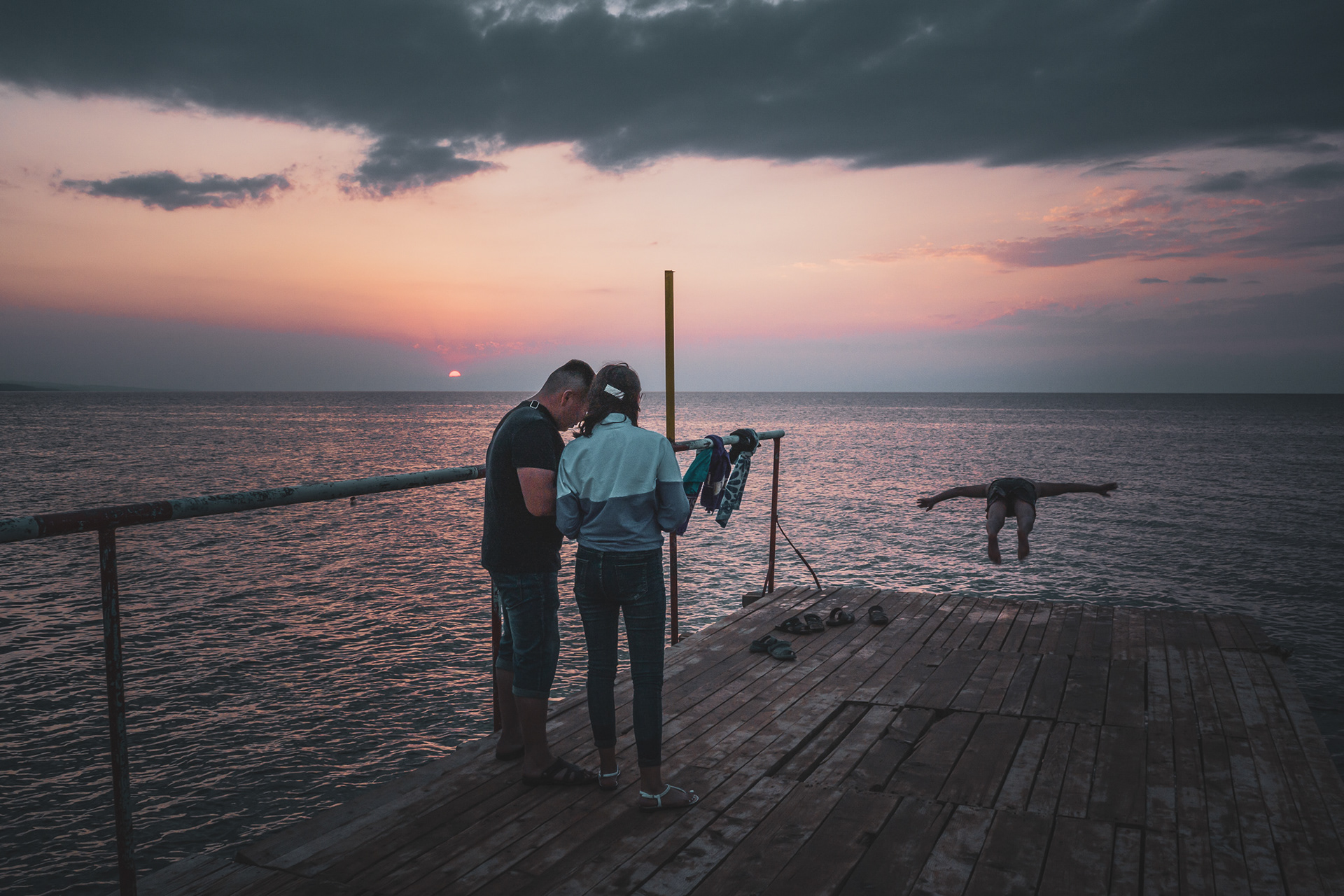
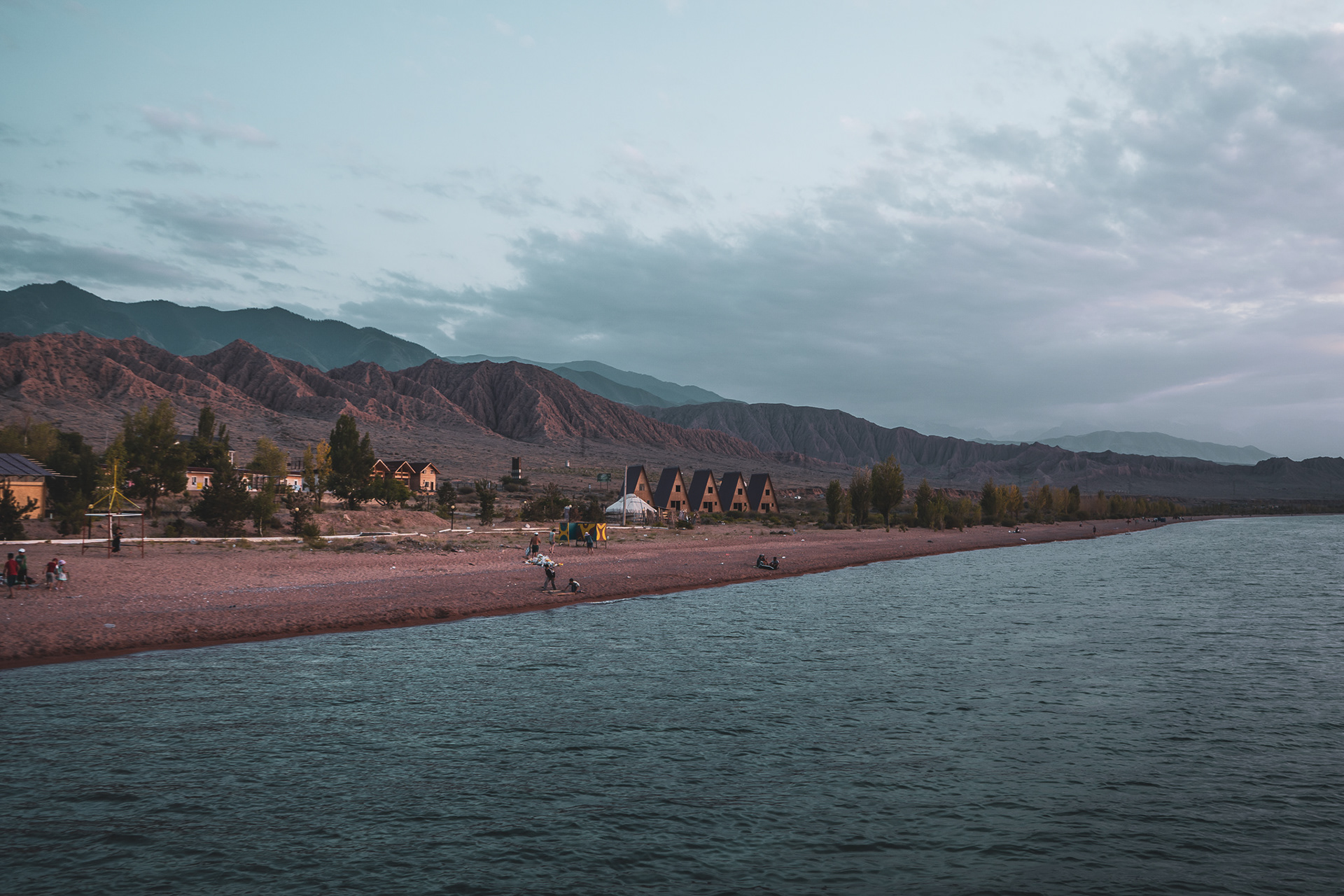
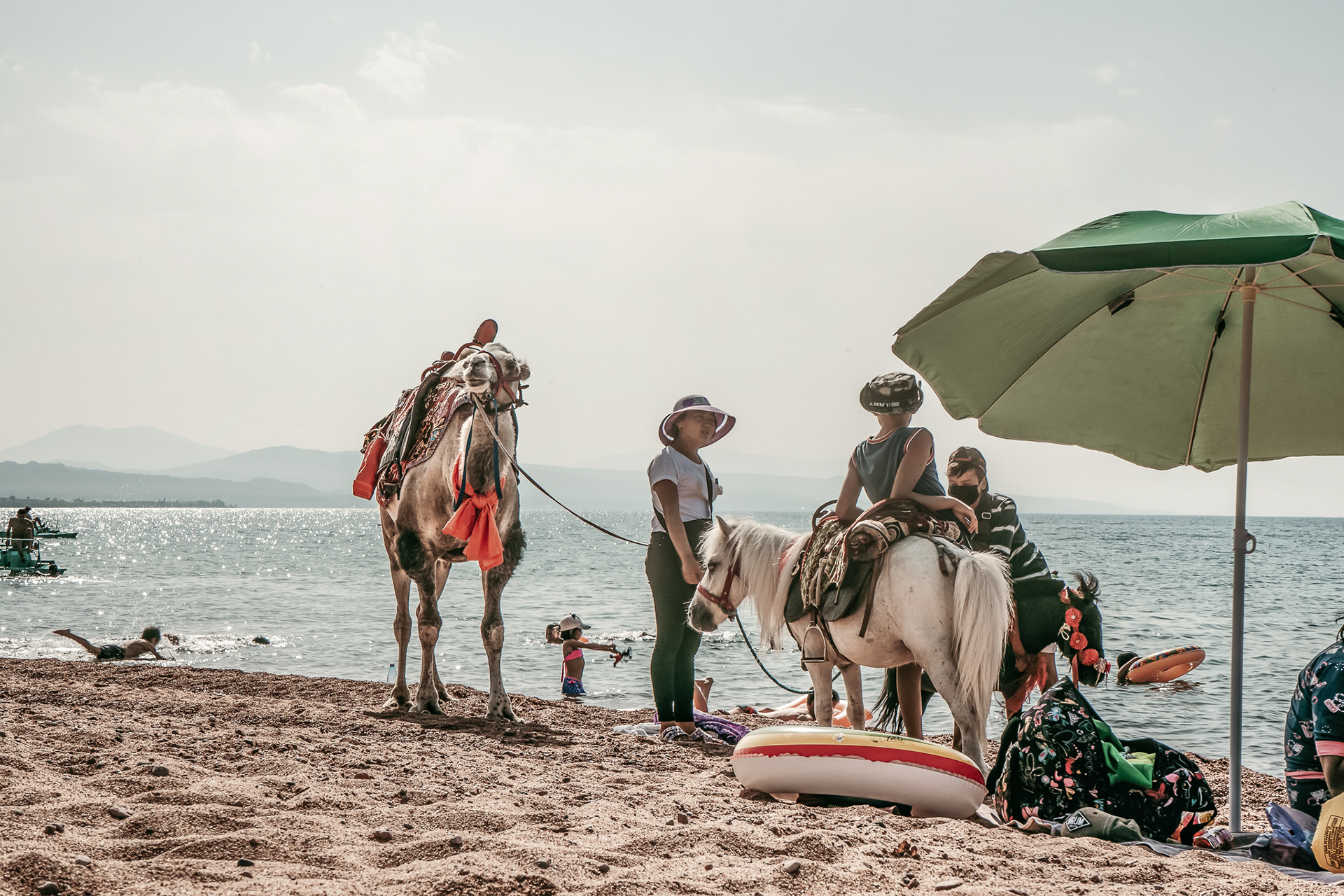
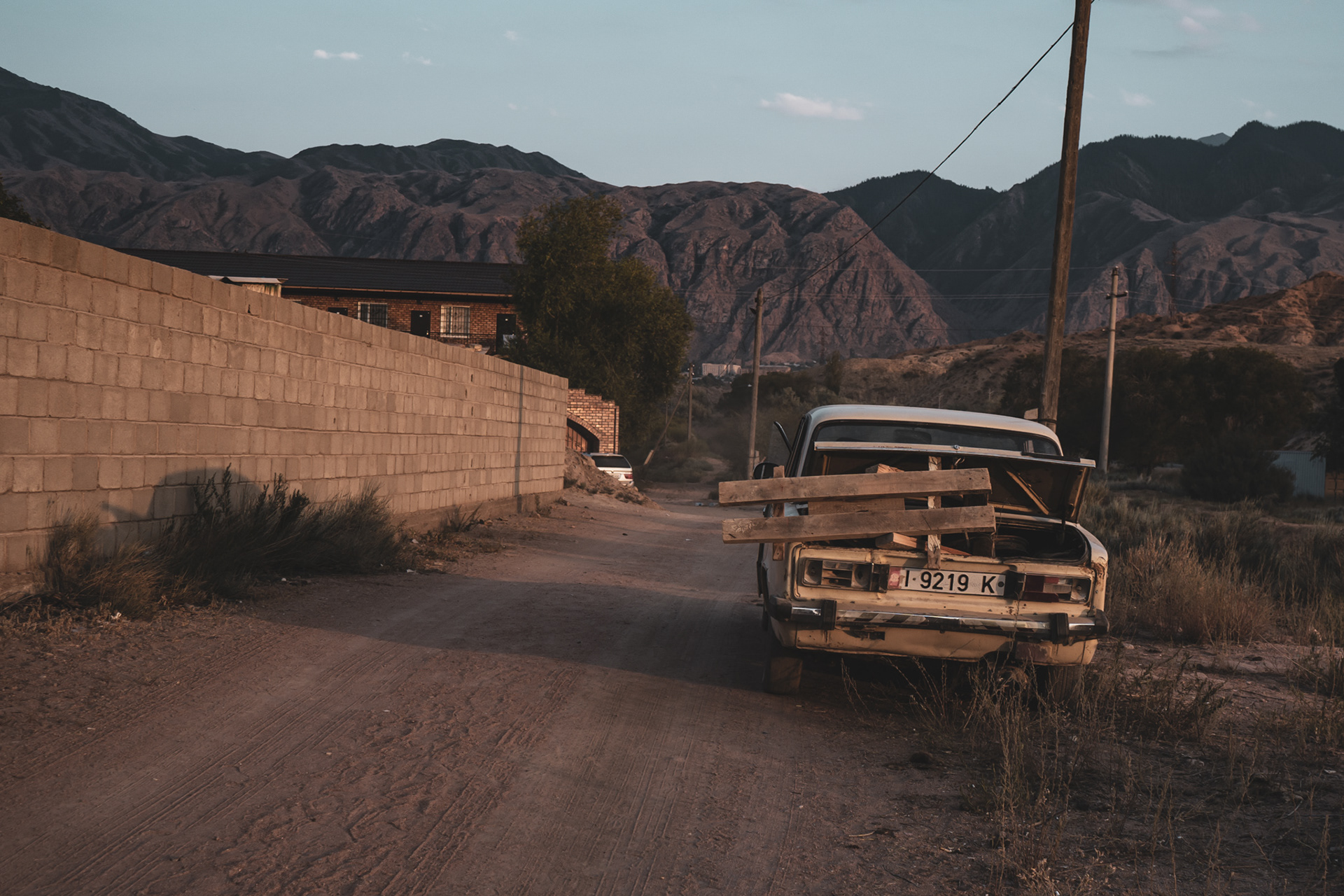
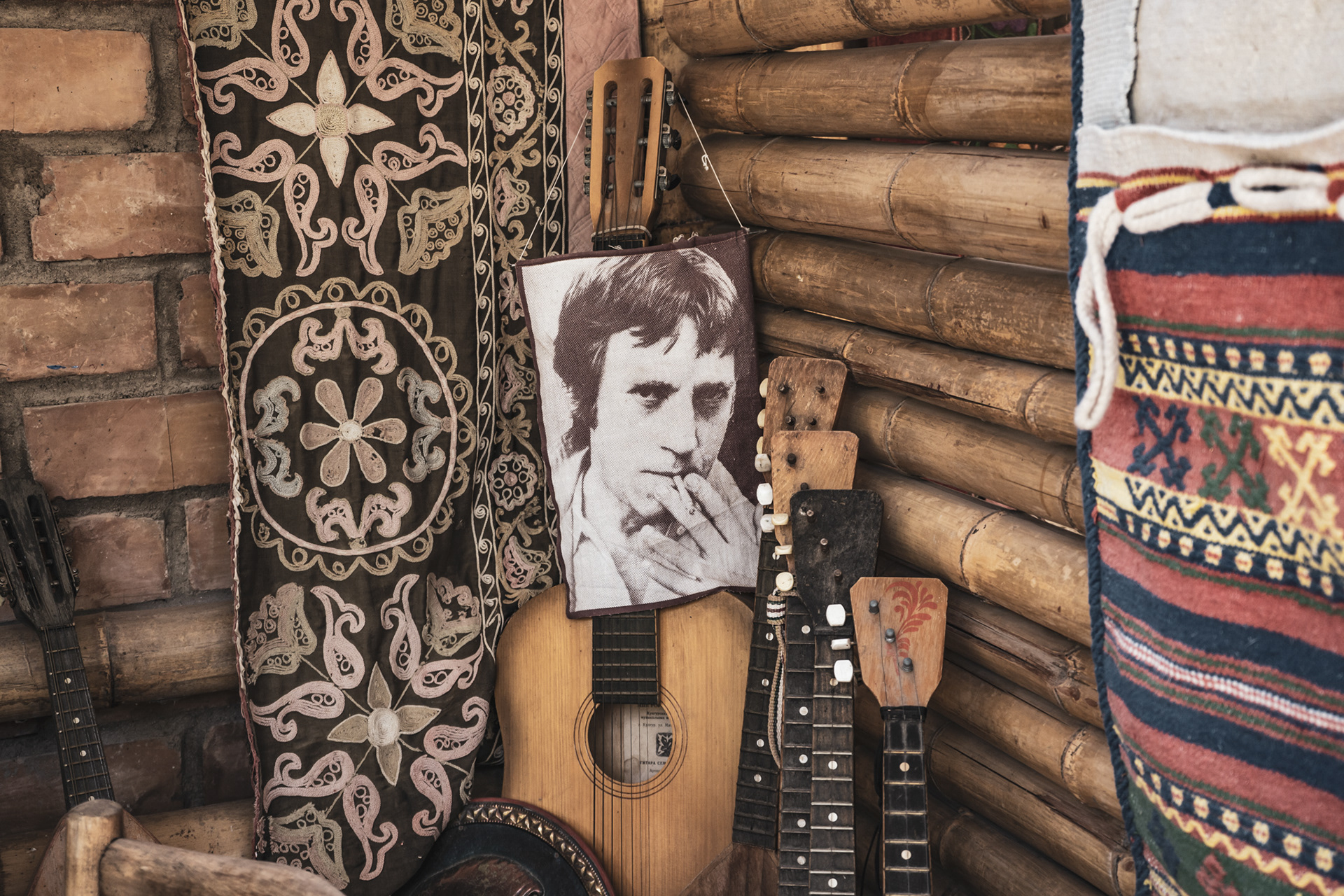
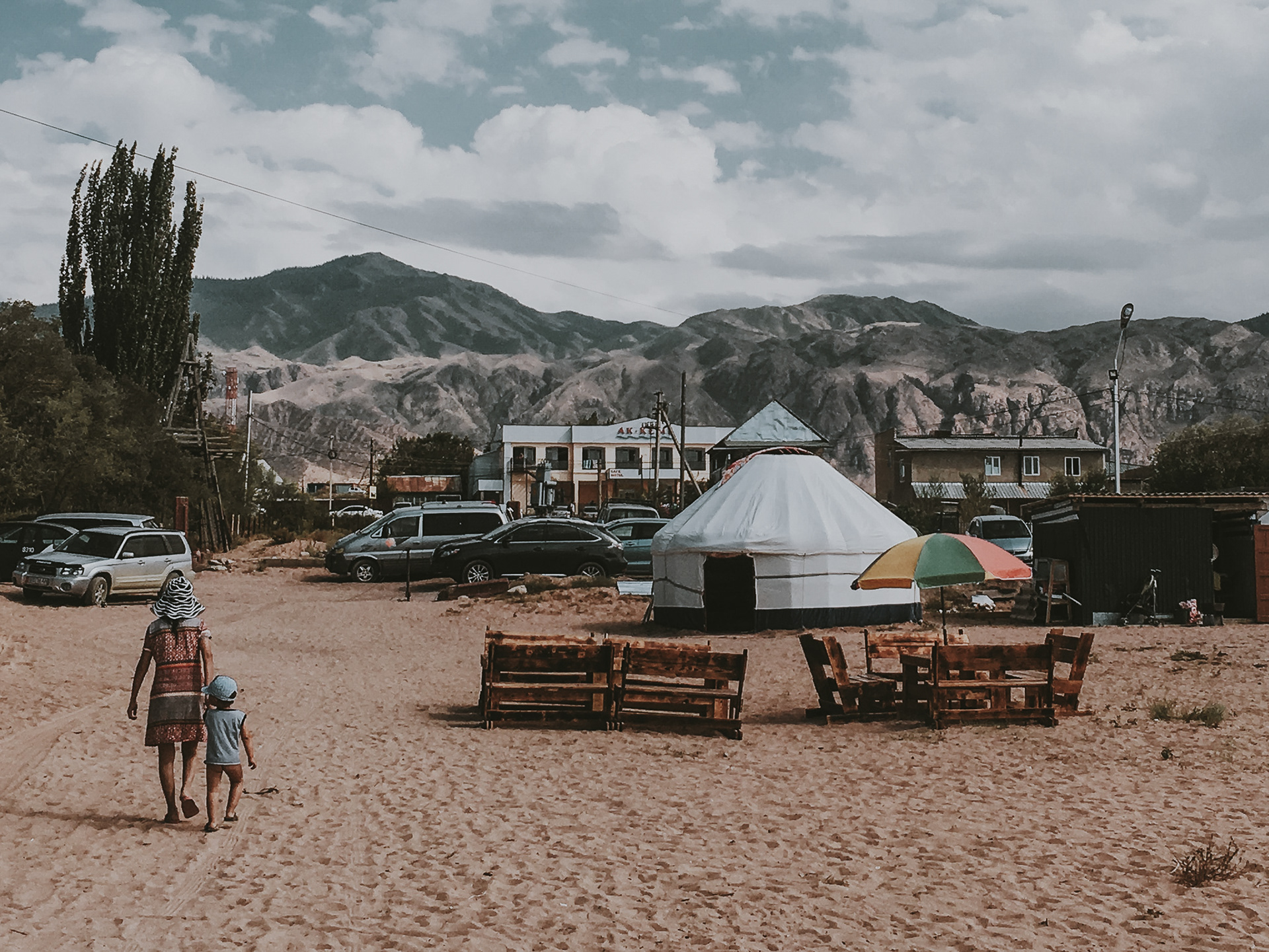
The Salbuurn Festival
We learn about the Salbuurn Festival from Nazira. She works for the South Shore organization, a travel agency based in Bokonbaevo whose mission is to promote and revive cultural activities on the southern shore of the Issyk-Kul, in the wake of the Soviet occupation.
The Salbuurn Festival takes place once a year and showcases all of the activities in a day-long event held in the mountains. Eagle hunters, falcon hunters, dog breeders, archers, dancers — all types of performers gather in the prairie to show off their abilities.
When we arrive, we notice that the audience is largely Kyrgyz.
Almaz Akunov, the founder of the South Shore organization, is in the audience, too. He is a sturdy middle-aged man with smooth skin and a contagious smile.
When we spot him, he is deep in an intimate conversation with the only other tourists at the festival. He speaks Russian, and his two interpreters translate into English for the benefit of the tourists, and into Kyrgyz, almost whispering, for the benefit of a group of Kyrgyz elders.
“I had to answer a calling,” says the interpreter, as Almaz points to the sky.
“I had to leave my career and devote myself to making sure Kyrgyz traditions didn’t die. That is why I spent years gathering information from elders, archives, notes, and memories. I went digging for information that was buried for years during the Soviet era, regarding games like Salbuurn.”
Salbuurn, after which the festival is named, is a type of hunting on horseback that involves both a Taigan dog and a golden eagle. It is just one of the many disciplines that Almaz has researched and brought back to life.
“I gathered, I researched. And here we are,” concludes Almaz.
At that point, one of the Kyrgyz elders stands up. It is time to pray before the games can resume. Kyrgyz people hold their hands up, and the few tourists follow suit.
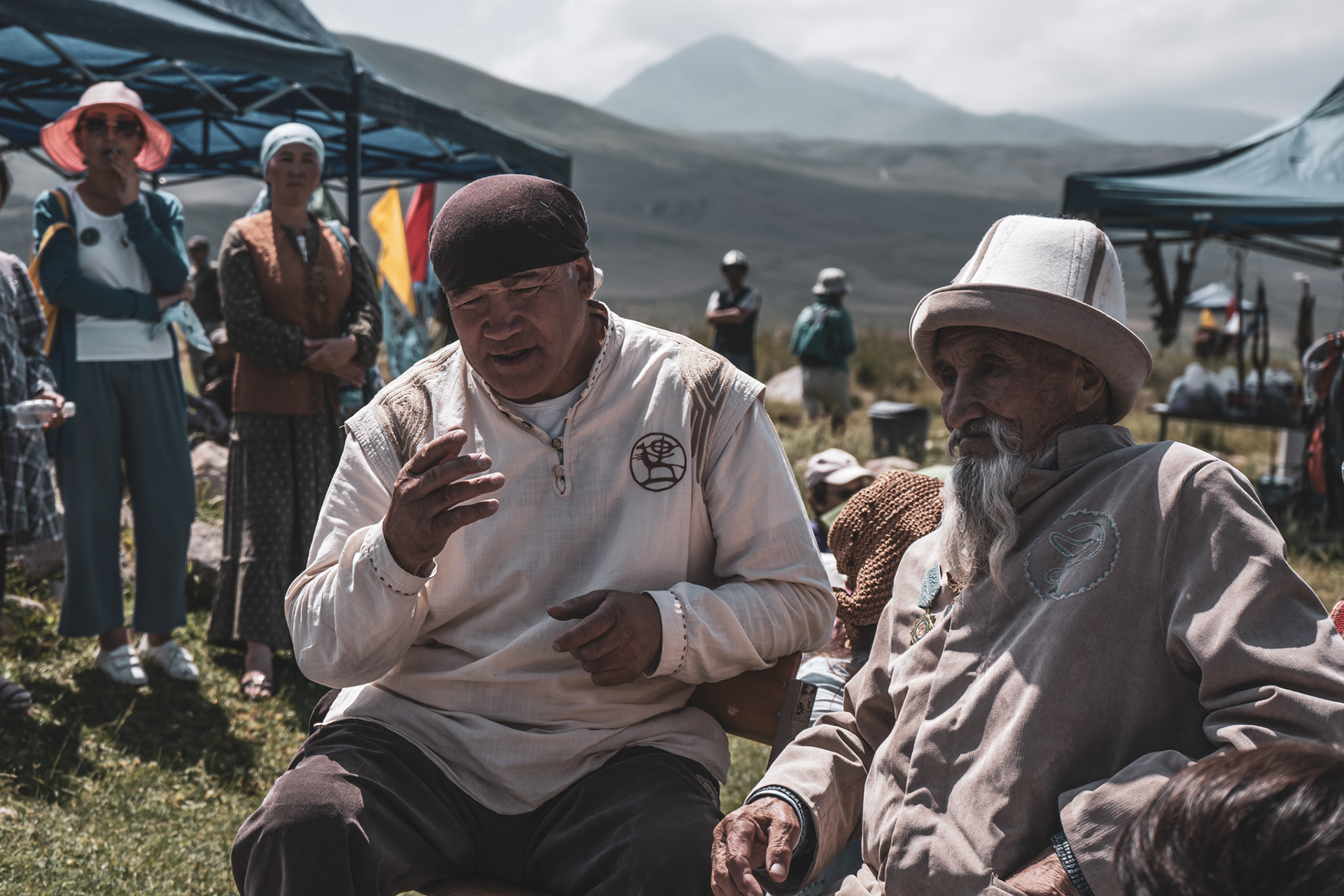
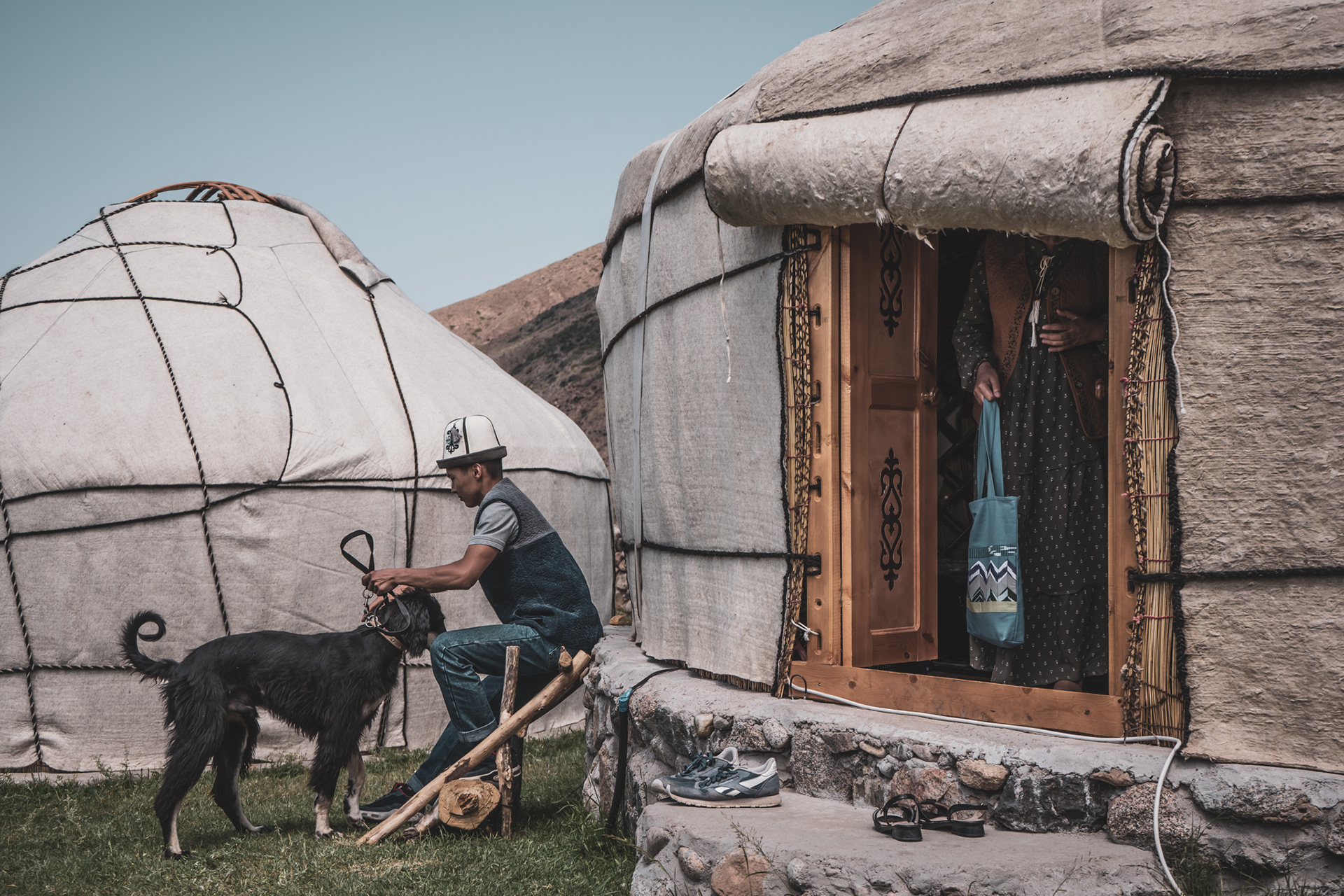
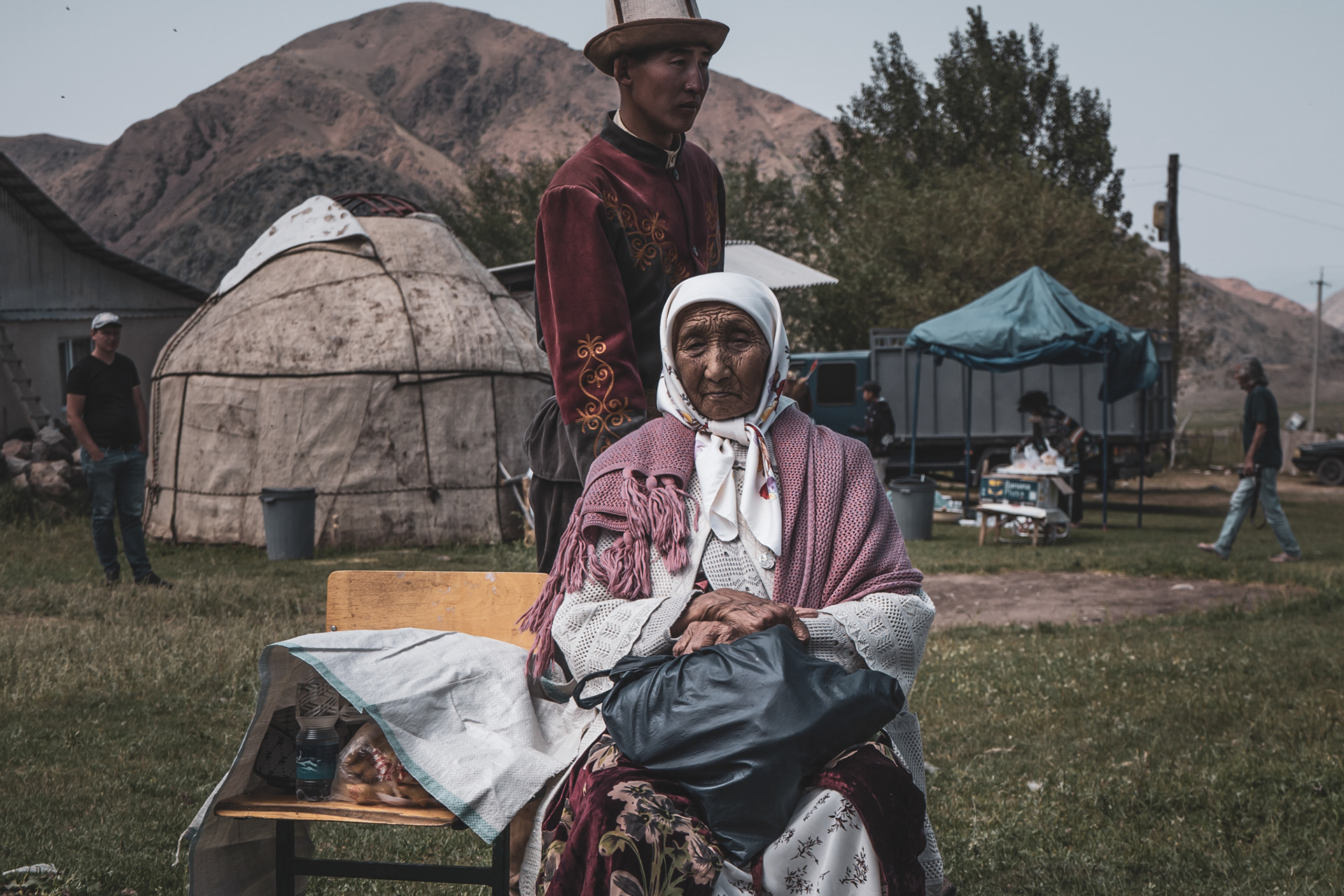
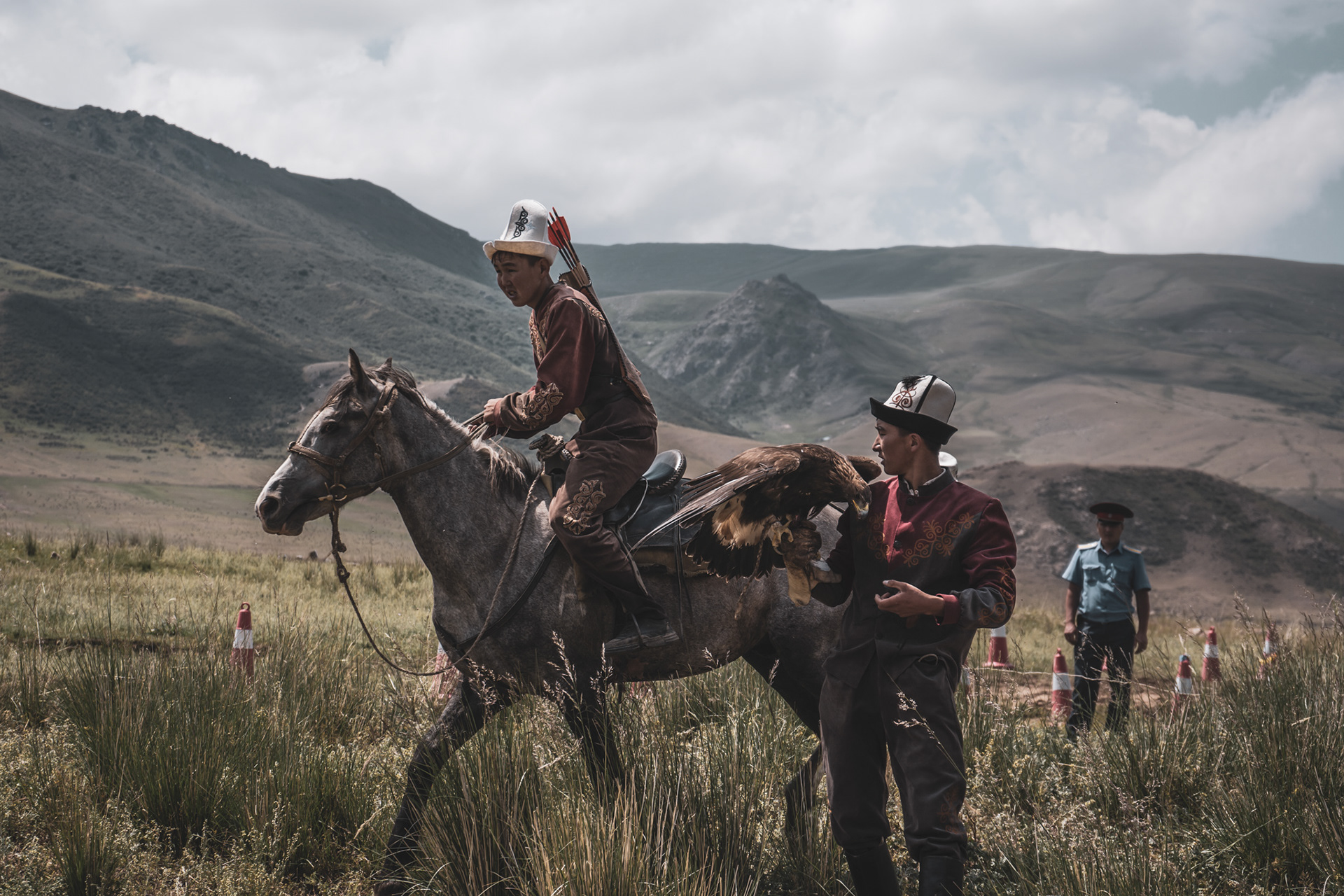
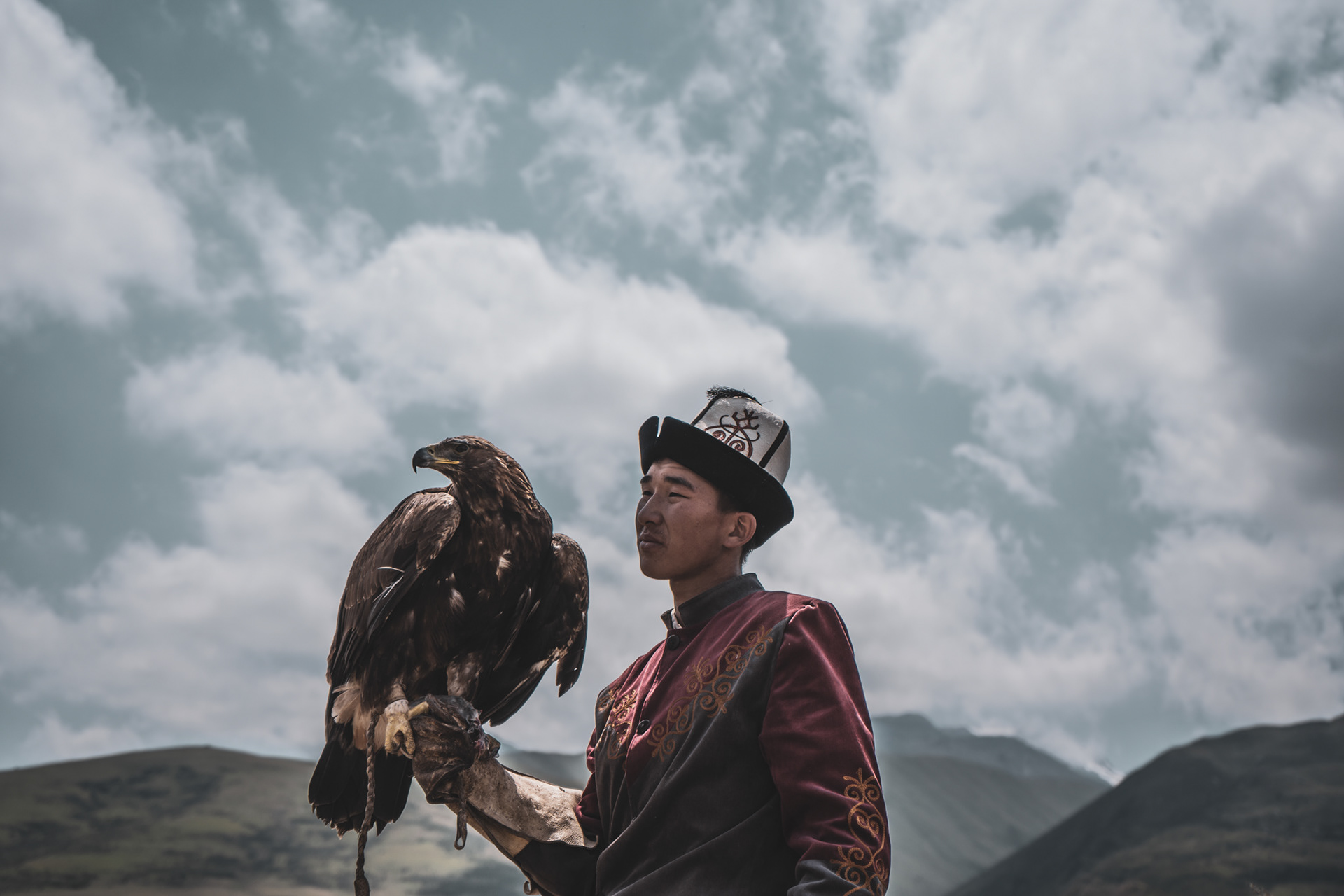
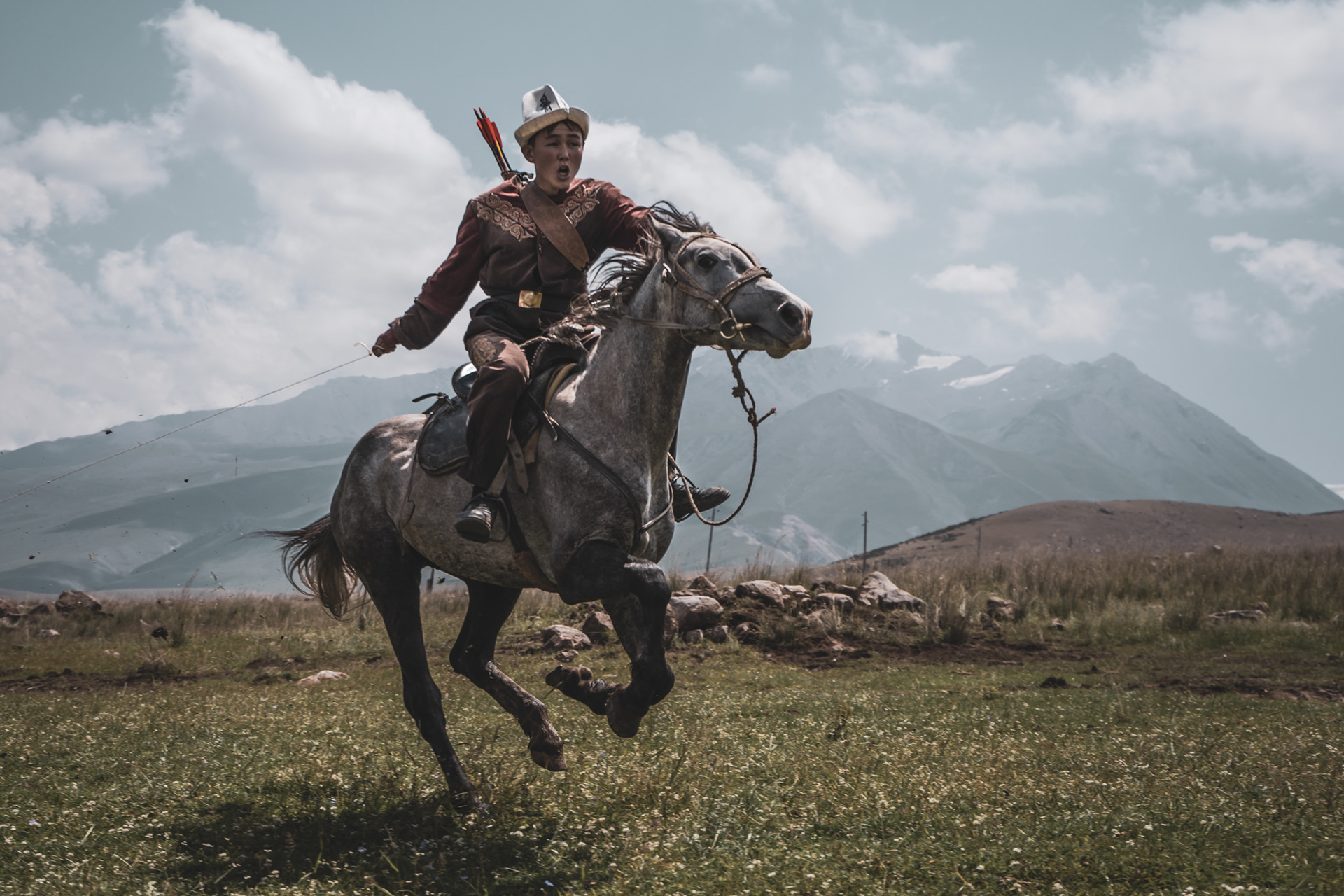

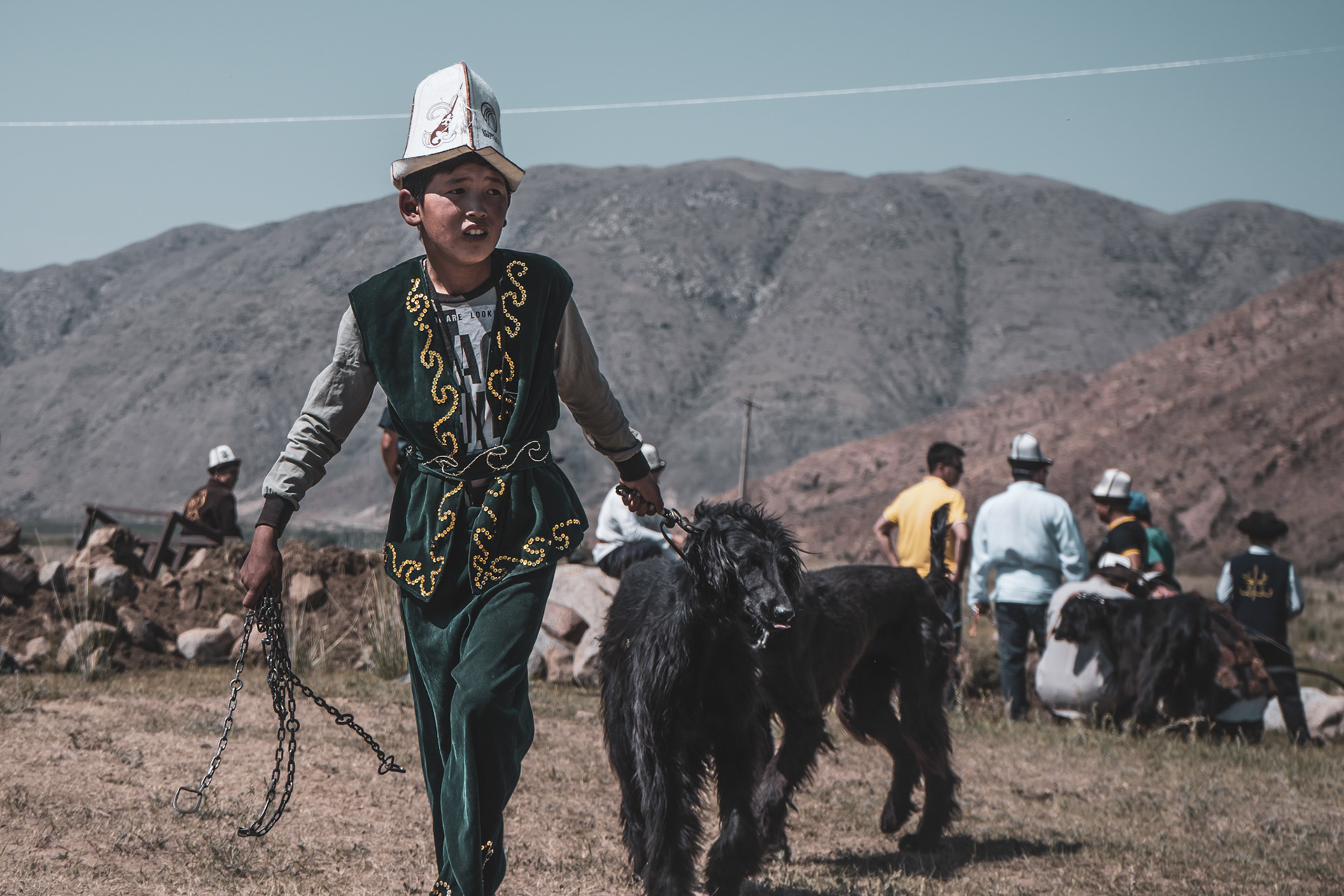
Kochkor
Ruslan is our driver to the Song-Kol Travel guesthouse and travel agency, which he also manages. The guest house is located in Kizart and serves as a starting point for excursions to the Song-Kol lake, which can be reached via a two-day climb, either on foot or on horseback.
He has come to pick us up at the Art Hotel and drive us to the guesthouse for a quick lunch . — then we’ll start our ascent towards Song-Kol lake.
His happy face smiles at us through the rearview mirror.
“I arrived at 7 in the morning,” he says, which means he probably left Kyzart before daybreak.
Half an hour into the drive he pulls over and buys a Twix and some Coke, in a desperate attempt to not fall asleep at the wheel. The caffeine probably gives him a boost, but it’s not long until he starts smacking himself again and pinching his nose — it appears he really can’t stay awake any longer.
“Want to take a walk around?”
“Yes,” we say enthusiastically.
We make it to an area that looks to be half market, half parking lot in Kochkor, a village about halfway to Kyzart. Ruslan leans out of the car window, exchanges a few words with a man sitting in the back of his truck, and five minutes later the man is moving the truck so that Ruslan can park.
“You have 30 minutes,” he says, motioning us out of the car.
He locks himself in, pushes the back of the seat down, and starts sleeping.
As for us, we are in the middle of chaos. How Ruslan can sleep in this noise is a mystery. Everywhere is just packed with cars, improvised fruit stands, old ladies coming and going from the bazaar, and kids. Kids sitting on steps, kids selling watermelons, kids running around; as we walk, all of them stop what they are doing and stare at us. “Hello!” they shout, and wave frantically.
Being noticeable feels strange, but there is no time to dwell on this feeling.
The streets are swarming with people and there’s no cafe, no restaurant other than a Burger King billboard that advertises Asian dishes, so we take shelter in a small street off the main road, and we sit on the sidewalk, just outside a shop that sells flip flops.
We let Ruslan sleep for an extra ten minutes. When we leave, the closer we get to his home in Kizart, the more talkative he gets. He points to our left towards a big stretch of the steppe.
“Here there’s lots of uran. Russia and big companies discovered it. It’s useful, you know? For raketa. Missiles.”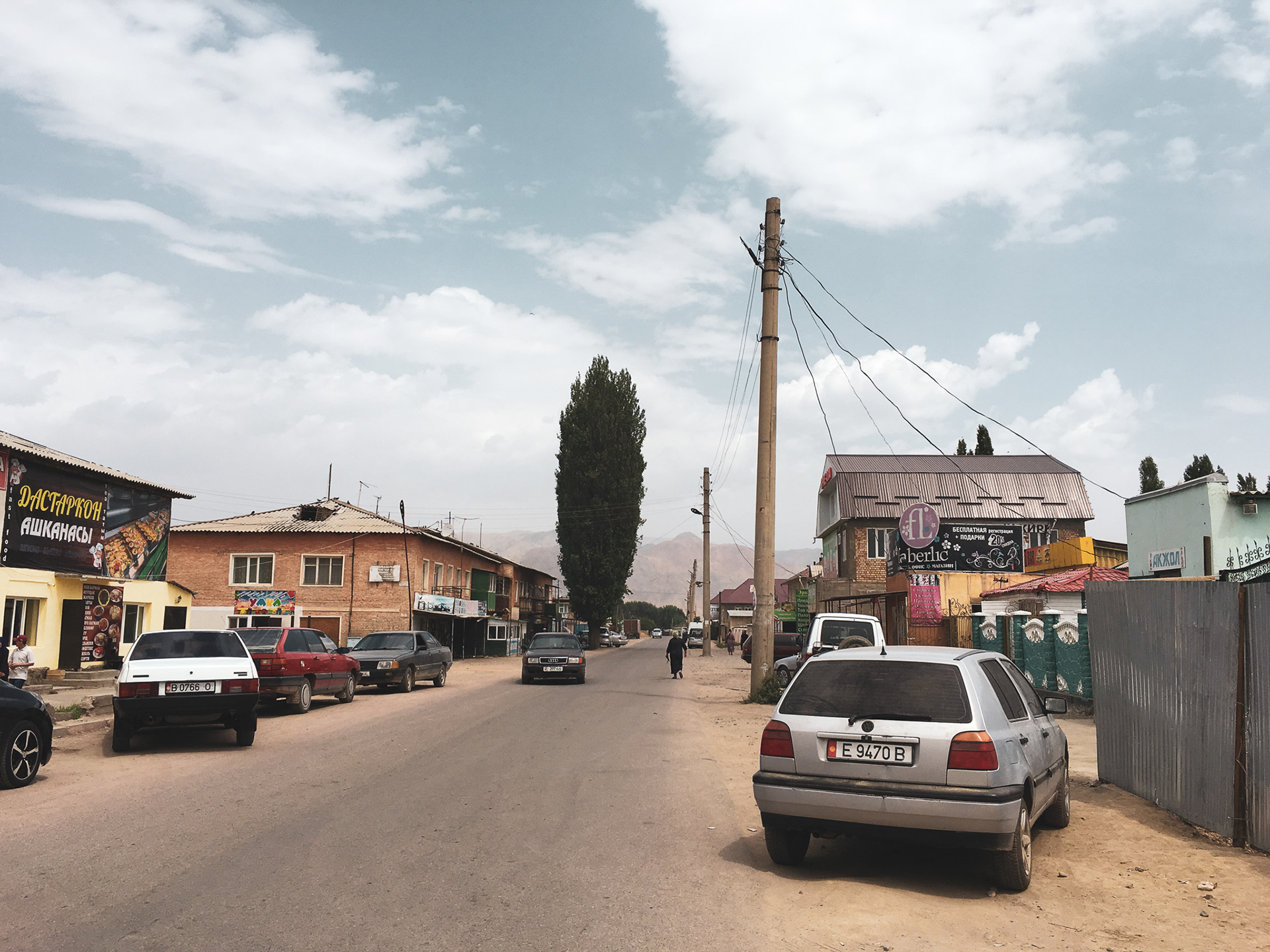
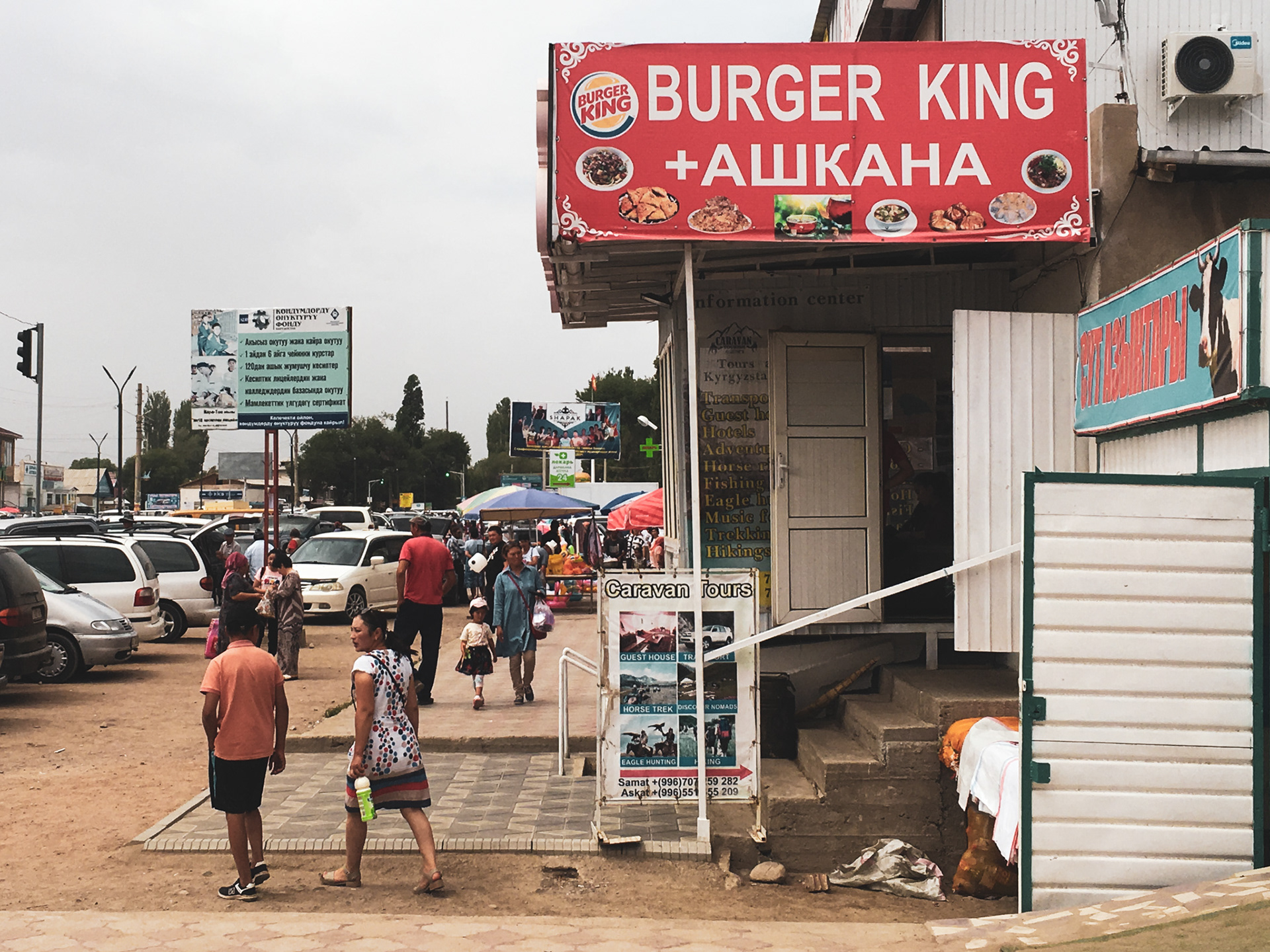
Kizart and Kilemche
Kyzart is but a handful of houses sitting at the feet of towering, bluish mountain peaks. The guesthouse is crowded with French tourists. Across the street, the remains of a minivan shelter a pack of hens from the white sunlight. A smiling lady in a headscarf points us to a long table covered in plastic, flowery tablecloths, where some tourists are already eating their soups with meat.
Before we can sit down, Ruslan appears with a girl. She looks 15 years old and she is smiling at us.
“She’s your guide, Erkei. She speaks great English. Anything you need, ask her,” he says, and he disappears after a group of French tourists who are about to leave on horseback.
Sam joins us. He is a British backpacker who is also headed to Song-Kol. Ruslan drives us four to the start of the trail, which, he says with a smirk, was once part of the Silk Road.
So here we are, I think, as we step out of the car and on the silent steppe. This is the road. It looks to be nothing but the result of now-vanished wheels pressing dust into a track, but this adds to the charm. So do the hoopoes that fly by, rushing to hide in the tall grass.
As Erkei promised, this first hike is a very light walk to the Kilemche yurt camp, our first stop. As the track follows a mountain stream and then leaves it to take us over gentle, green slopes, Erkei and I talk a little bit. I want to understand more of her life, of what she does, of what she’d like to be.
“I go to school in Bishkek,” she says, her voice unflinching despite the ascending trail.
“But I can’t sleep there, there’s too much noise. In the summer, I come back here to work with tourists.”
She says this with delight; tourists are very important people in Kyrgyzstan and are certainly made to feel so. We are looked at and spoken to with the utmost respect. A tourist here is not a nuisance nor a money machine, but rather a strange-looking person coming from lands far away to see what Kyrgyzstan is about. And this alone sparks a sort of quiet pride in the Kyrgyz, who will gladly oblige and go out of their way to showcase as much as they can of their country.
“Sure, I want to keep studying,” continues Erkei. “I thought about studying tourism, but that’s too easy. I might become a diplomat. Diplomats travel and speak many languages. I speak English already, but I’ll learn French next. I started learning some from the tourists.”
In her free time, she draws portraits and listens to k-pop.
The camp appears at the end of the trail. It is a handful of yurts scattered on one side of a spectacular, wavy prairie. Judging from the horses tied just outside, the French tourists have made it there before us. Sam assembles his own tent a few yards away — he is a true backpacker, challenging the elements in his bandana and sleeping bag.
“Tea will be ready shortly,” announces Erkei, with whom we share our yurt.
We have a few minutes to get accustomed to our accommodation. On the ground, three mattresses are laid out, covered in heavy blankets; close to the red wooden door, there is a small stove with a pipe piercing the slanted roof through one side. The tunduk is open and lets in the last sunrays. There is no lighting system. Once the sun sets, smartphones acquire just about their only usefulness in these circumstances — as flashlights.
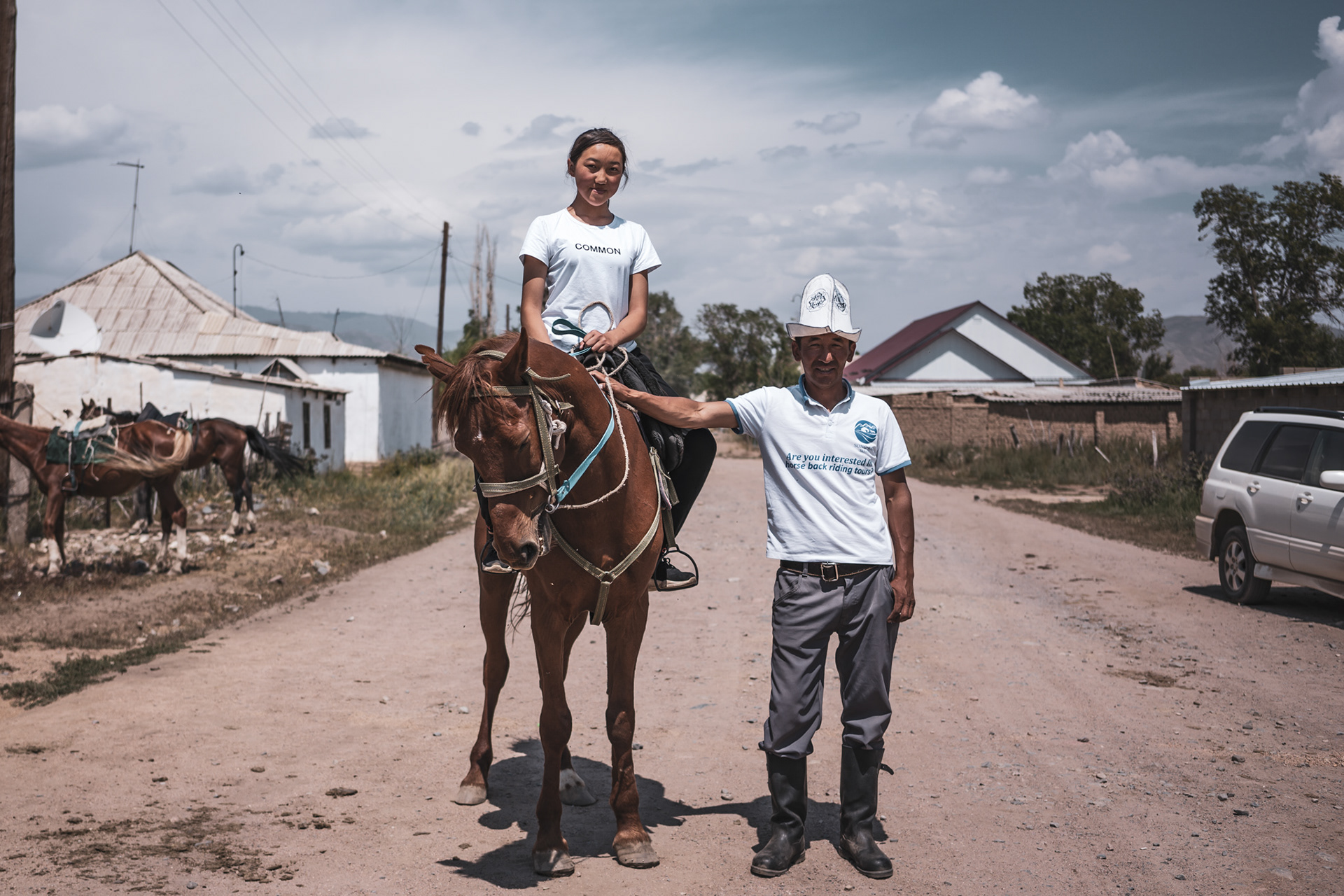
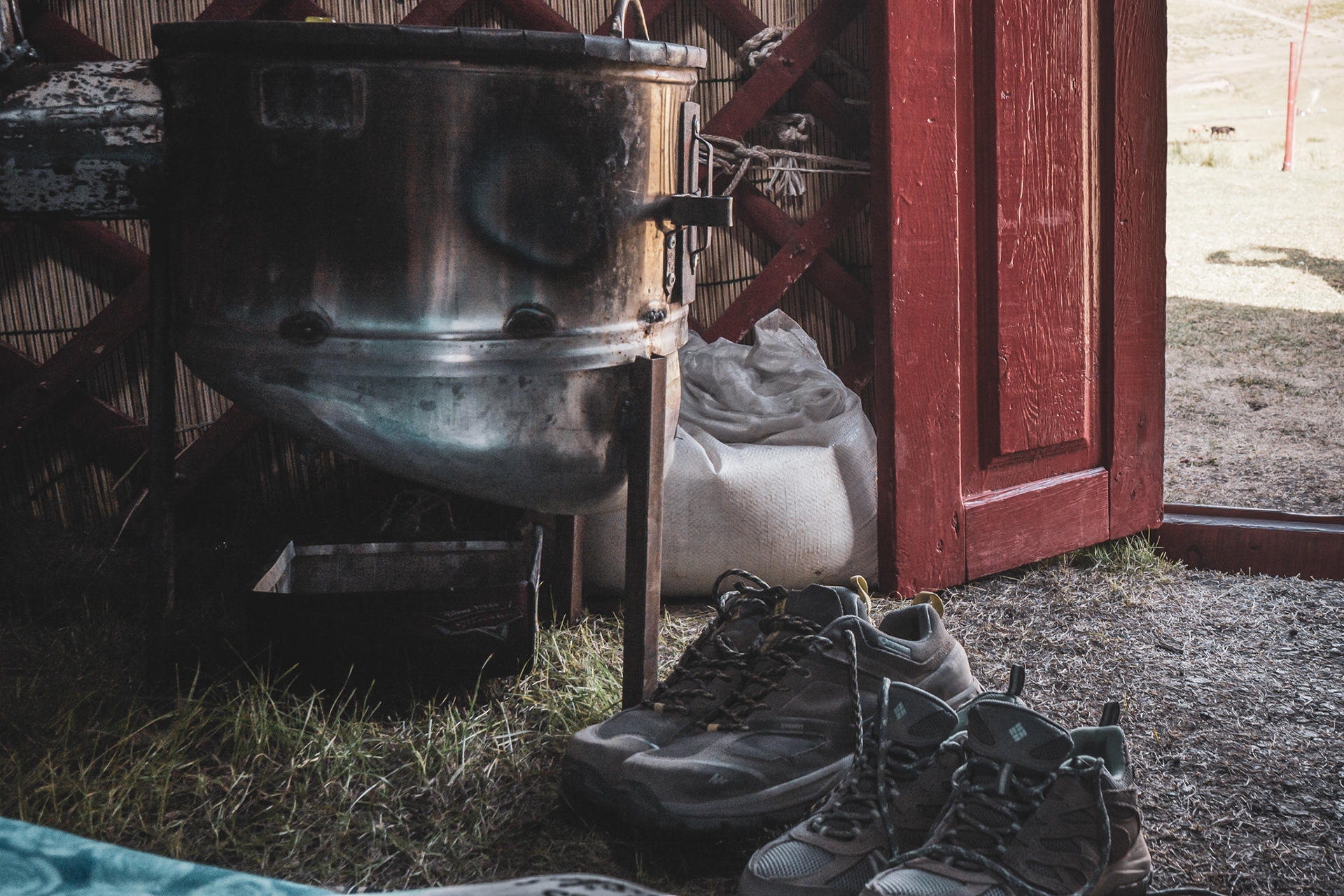
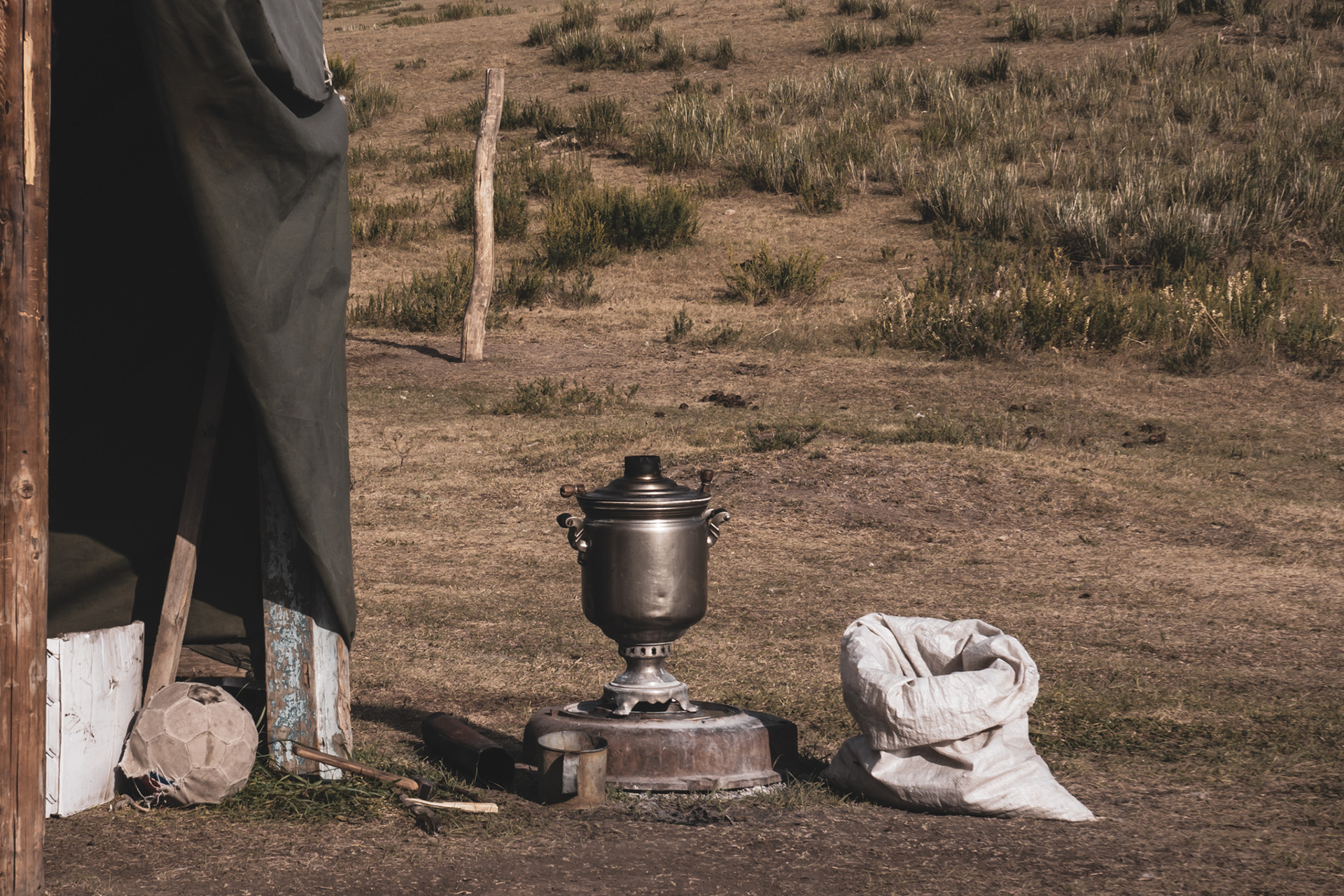
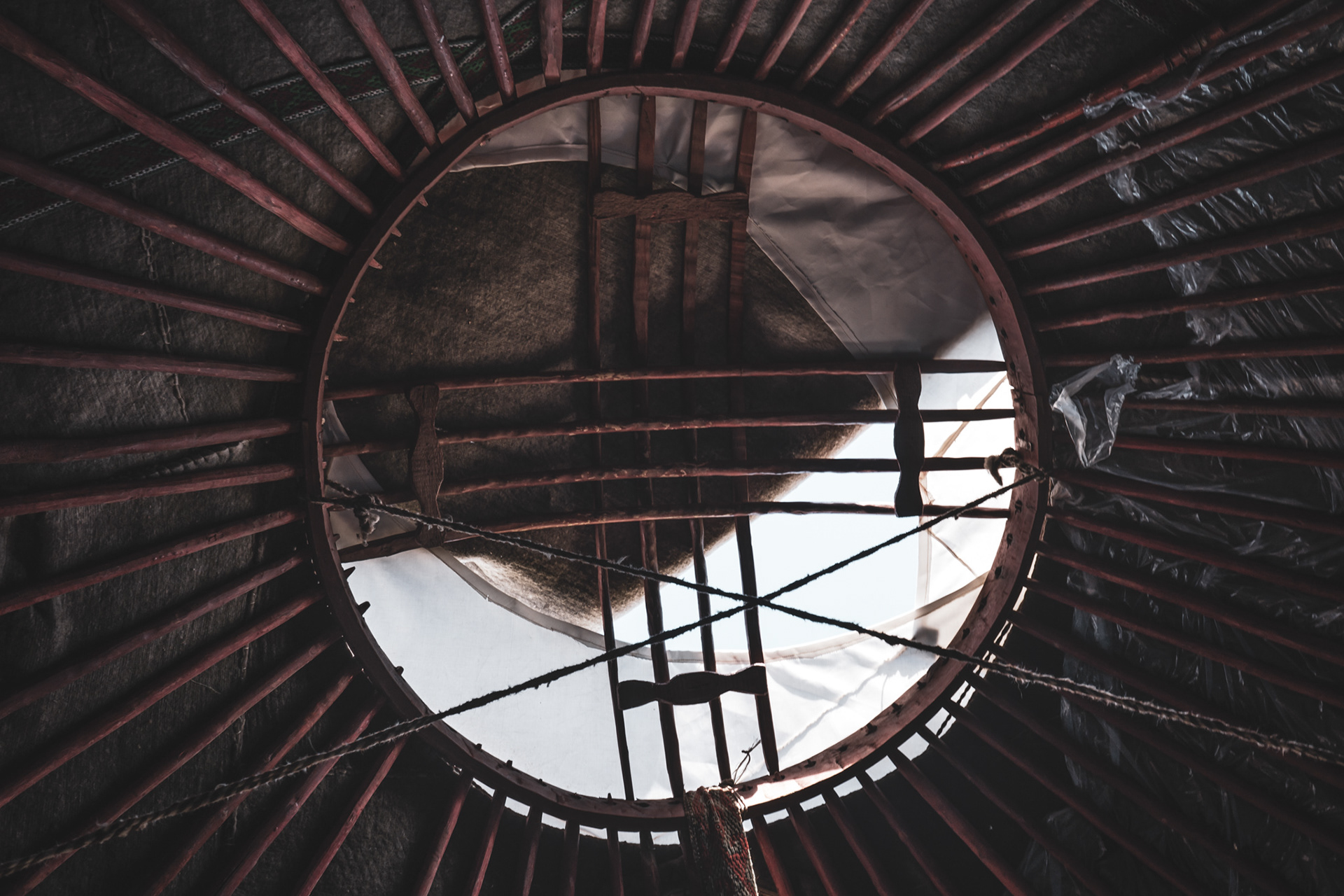
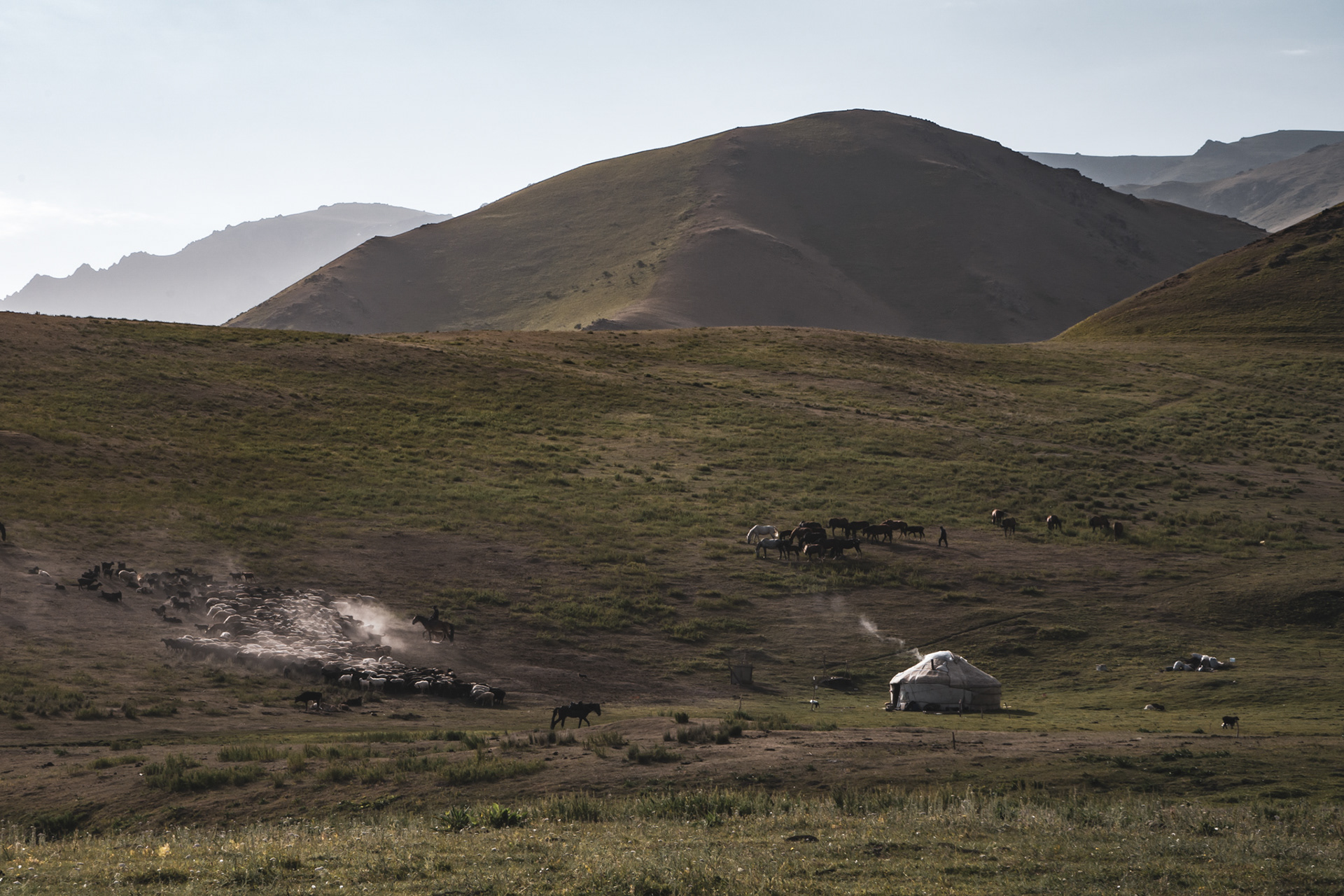
Song-Kol
Erkei has warned us — the ascent to Song-Kol is going to be tough. As for me, I’m ready for anything, or at least I think I am. We leave Kilemche as the golden light of dawn still casts oblique shadows on the pasture.
The trail starts going up in a very subtle way, and, sooner than I thought, I start gasping for air and struggling to find my rhythm. I stay behind with Sam, who is carrying his whole backpack and tent on his shoulder, and his presence comforts me. These slopes are insidious; they ascend lightly but persistently, and they are long. Around us, the scenery is majestic, but in a gentle way; rolling green hills extend as far as the eye can see, and pointy peaks and harsher passes soar vertically in the distance.
Our goal is to reach the Lone Tree pass; Erkei says it is the easiest way to get to Song-Kol, as the lake is nestled into a bowl-like valley and surrounded by the very same peaks we are looking at right now — just on the other side.
Erkei is kind but does not care to hide impatience. Her pace is steady, calm but fast, and she could be well ahead of us in no time. But, unluckily for her, my pace is slow. About two hours into the climb, the trail gets much steeper and the grass slowly gives way to rocks. We’re not even halfway there. I remember a quote my dad, an eager climber, once shared: in the mountains, you only go as far as your feet take you. You can’t rely on anything else, really, other than your feet and your will to put one step after the other. It is that simple. Every five-hour trek is made of single steps, one step after the other. It is an exercise of willpower, focus, and abstraction; when the body is taken to conditions it is not accustomed to, in this case, fatigue, crystal clear air, and complete silence, it is then that the mind acquires a new level of clarity.
On top of it all, as I listen to my breath within my bubble of concentration, I feel period cramps kick in. Of course. I was hoping I could make it through the trek before the time came, but no luck. I usually gulp down some ibuprofen and stay still until the worst is over. Now, at nearly thirteen thousand feet on a Kyrgyz pass, with drizzle coming down and a long way to go, that is hardly an option. But I come prepared. I crunch on some crackers, take my loyal dose of ibuprofen, catch my breath, and resume my climb.
Positive thoughts only.
At long last, we make it over the Lone Tree pass, and our legs are released from the tension of upward climbing. What rests on the other side, as sweet as only a reward can feel, are miles of lush prairies and pastures speckled with wild horses and lost yurts. In the distance, a blue crease stands out like a finish line: the waters of Song-Kol.
Erkei reaches down to pick some flowers. “We make tea with these,” she says, and she picks dozens of them. I realize the pasture we are crossing is covered in those small, hairy flowers with white petals and yellow round inflorescences. Edelweiss.
Soup has never tasted so good.
In the common yurt, tea boils in the samovar, and Sam borrows some hot water for his noodles. A handful of Kyrgyz men chats at a table behind us, and a small girl sits by the door, picking the strings of a komur. When Sam takes out his pack of noodles, five or six emotions appear simultaneously on her face. The komur is immediately forgotten, and she must absolutely watch this bright green package turn into food. Sam offers her some, but she refuses. You eat it, she gestures. Then, she looks at me and begins telling me a long tale of murmurs and shapeless sounds, to which I can only nod, shake my head and gasp.
Song-Kol is a big lake, and a grumpy one. Legend has it that not a day goes by without a downpour of rain. After lunch, we make the most of a sunny break and take a stroll to what looks to be a lonely yurt on the shore. It is indeed an abandoned yurt, torn apart by God knows how many storms. The roof has partially collapsed on a red velvet armchair. Debris is scattered all around, and a cow rests in what little shade is projected by the bare structure of the yurt.
That evening, we ask Erkei about it.
“That’s a fisherman’s yurt,” she says. “But there are almost no fishermen on the Song-Kol. Because there is almost no fish left.”
The night gets really cold. The wind howls, it is thundering, and two shepherd puppies curl up outside of the big container serving as a shower facility. The sink is just outside of it. We brush our teeth with the aid of a flashlight, under light rain. In the yurt, the fire in the stove projects tongues of dancing light on the wooden skeleton of the ceiling. There is no need for heavy clothes once the heat has spread.
In the morning, we must leave Sam to play with the shepherd dogs and head back to Kizart. We need to climb over another pass, this time an easier one to face. Erkei leads us through the green pastures, and through patches of land owned by shepherds and covered with cow and horse excrement.
A few angry dogs bark at us in the mountain silence.
The hike is not as intense as the day before, but just as long, and this time, after we leave the pass behind, it is all downward; we are circling back to where Ruslan’s car left us two days ago. My feet hurt from hitting on the inside of the shoe as we descend for hours on steep horse trails, but the scenery offers a great distraction, and soon I become accustomed to the pain.
Five hours later, Ruslan greets us with a smile and lets us rest a while as he washes his car with icy water from a nearby stream. I greet him, and I feel a sense of closure. I’ve faced the mountains and what I thought were my physical limitation, only to find out I haven’t quite reached them. Erkei relaxes in the grass, apparently untouched by fatigue. As for me, I dip my feet in the water and it’s so icy it hurts, but it’s the best feeling in the world.
I wouldn’t want to be anywhere else.
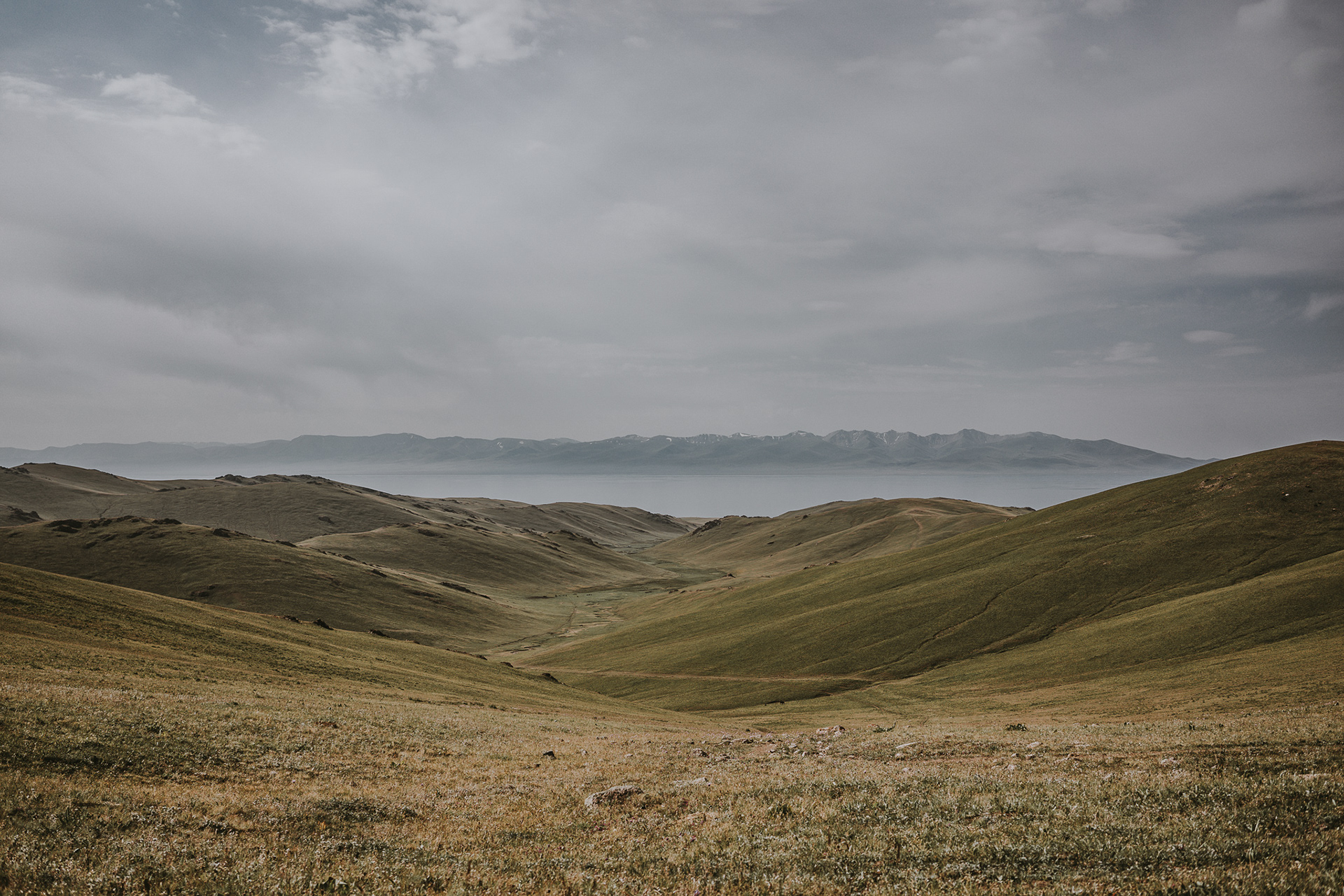
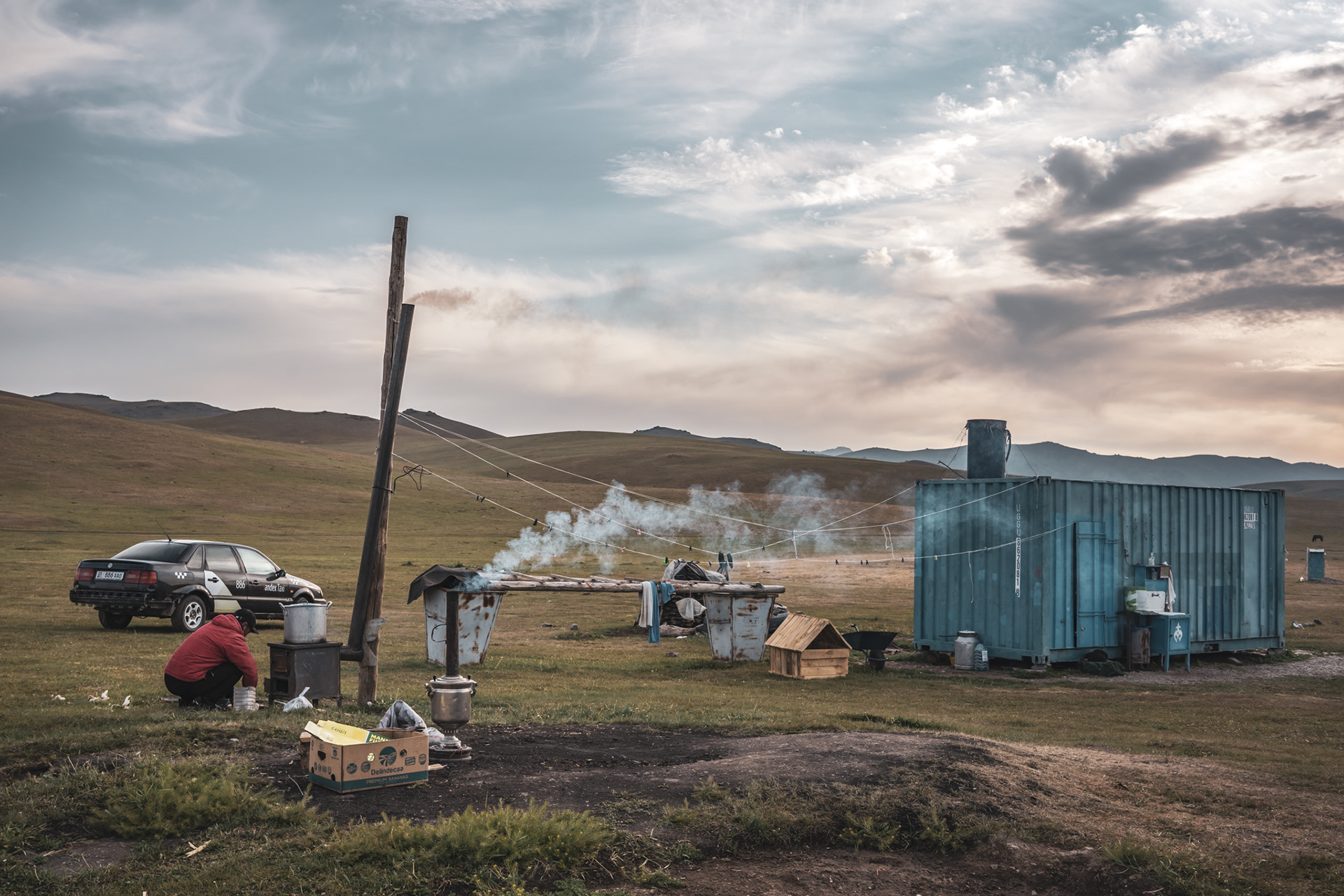
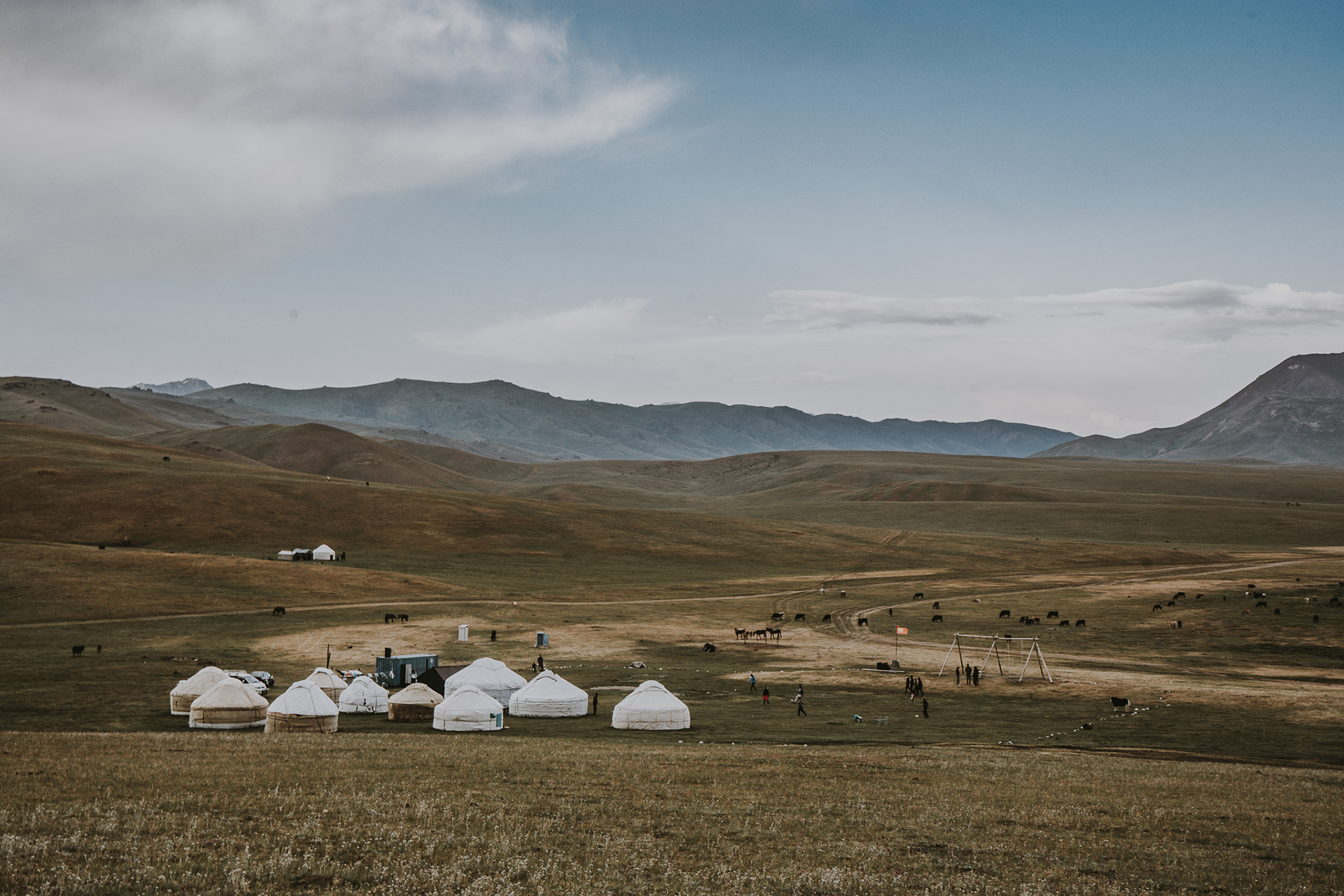
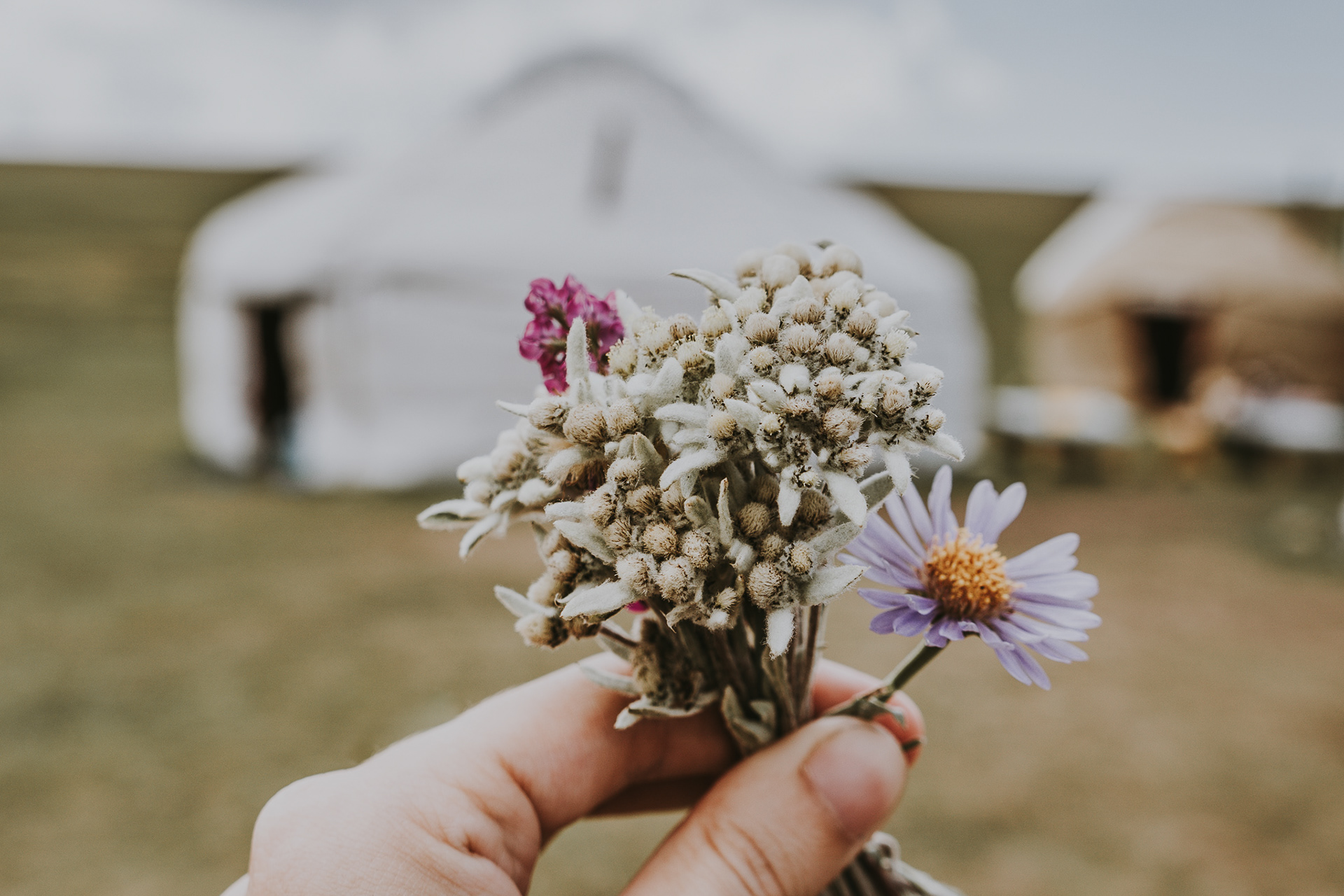
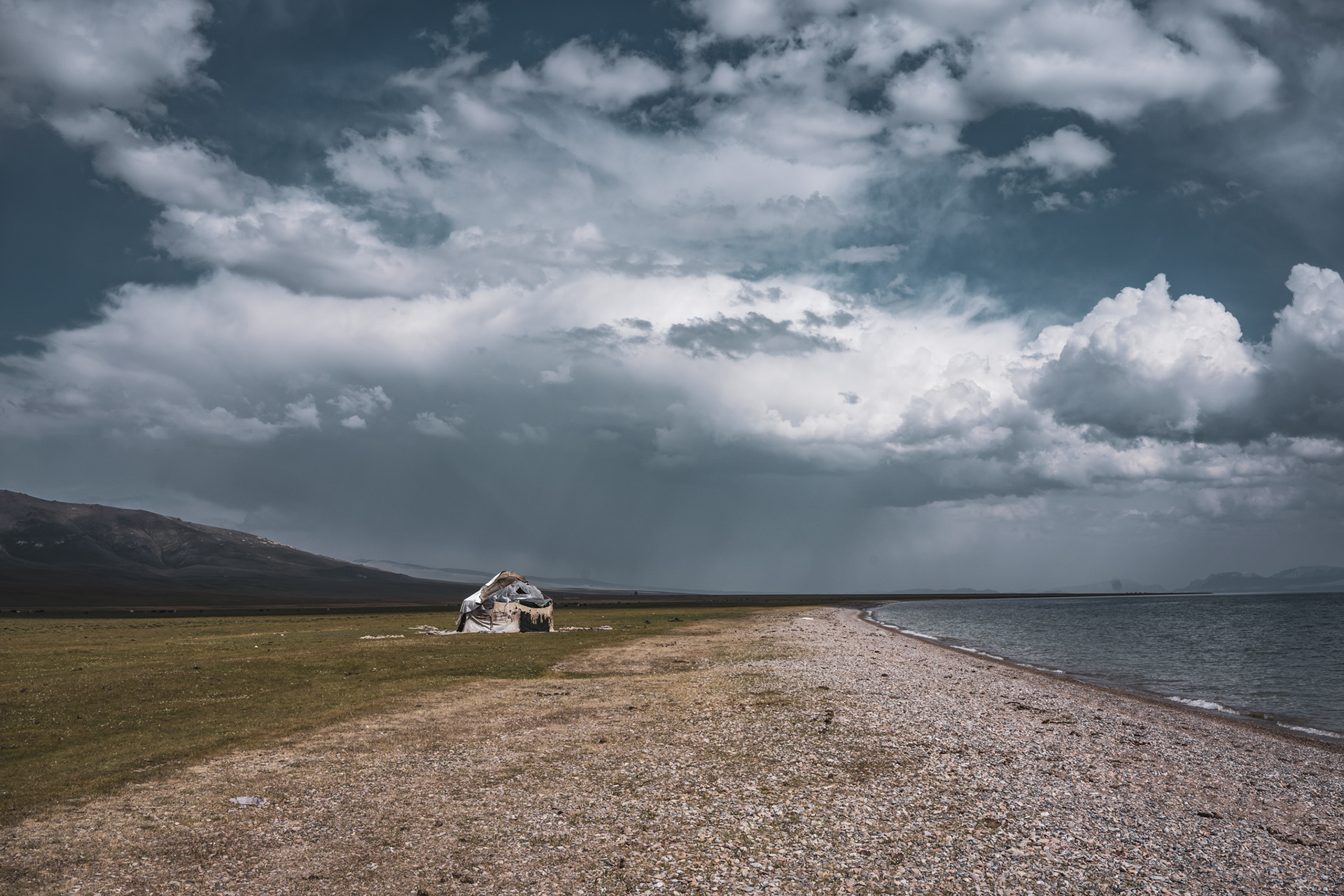
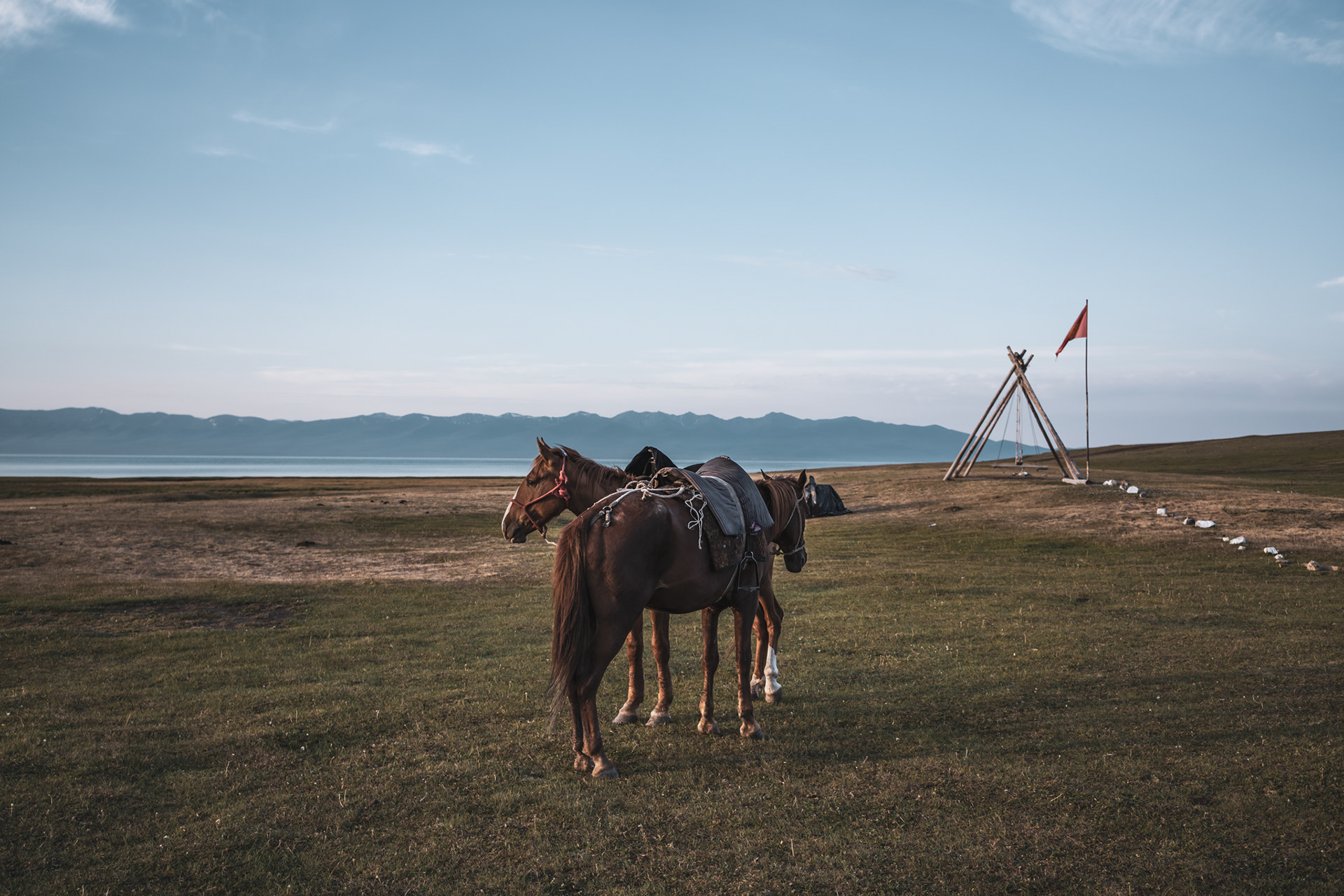
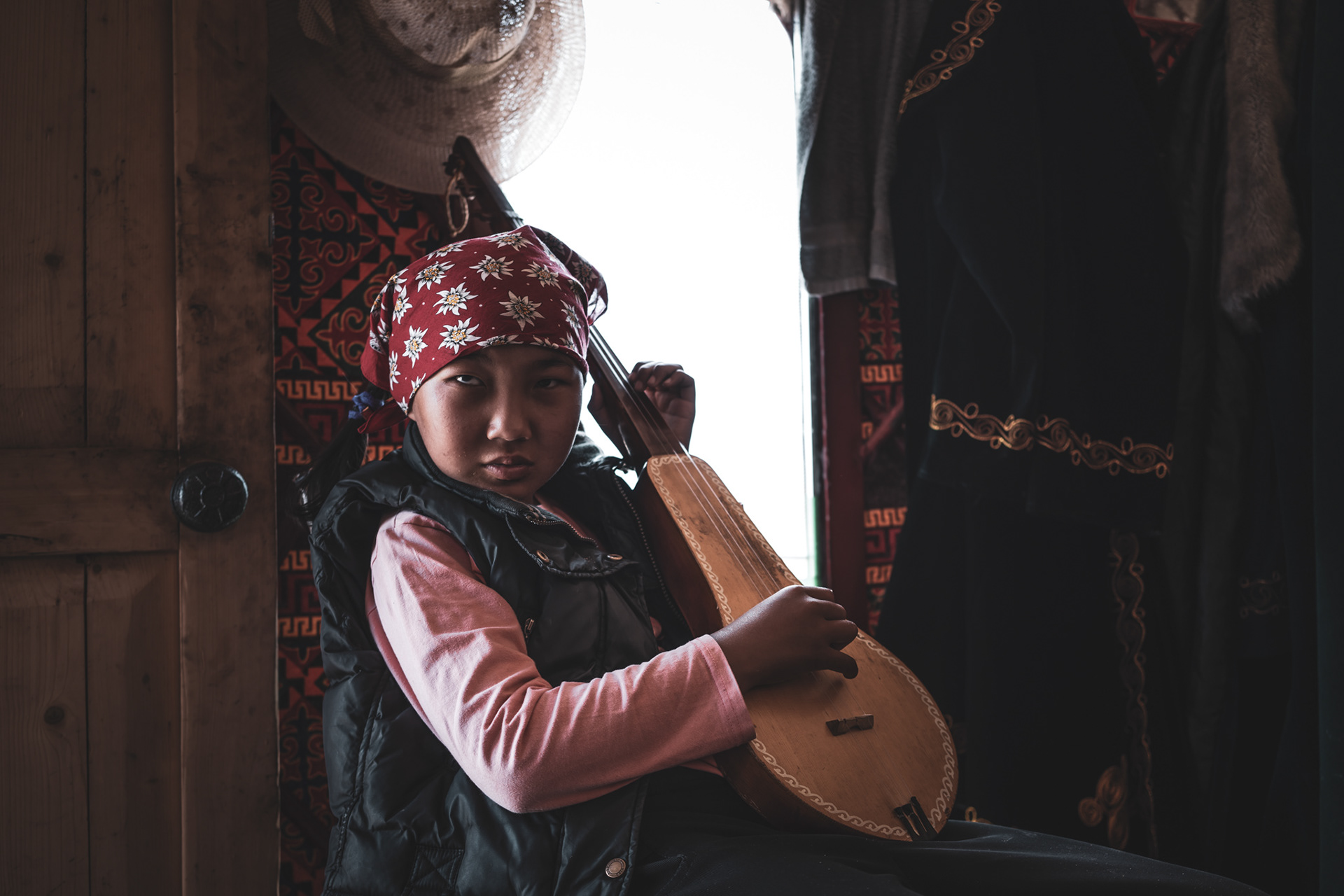
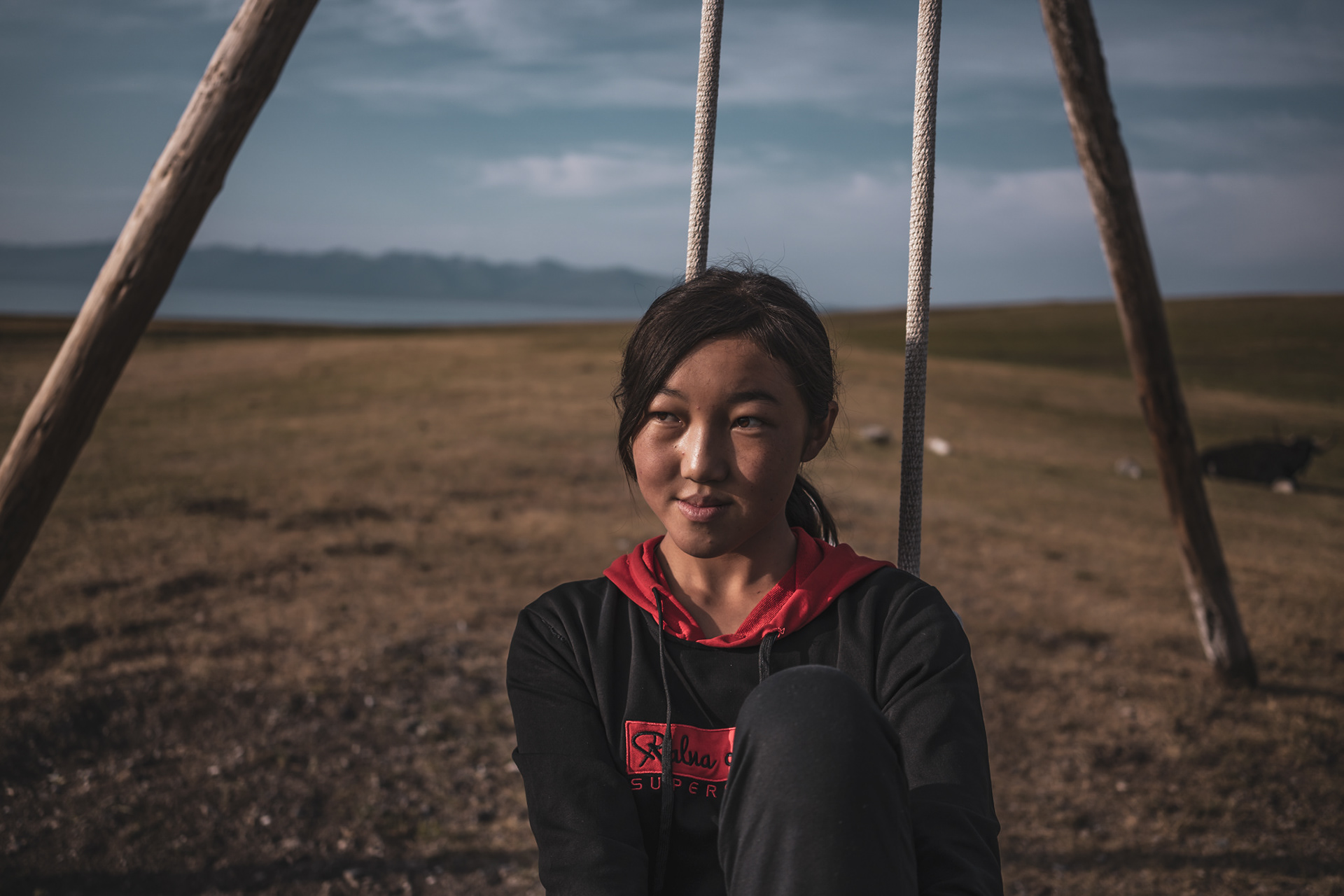
Nomad Portraits
It is time to head to Bishkek. Ruslan’s wife Aizada and their toddler daughter join us on the four-hour drive to the capital. I don’t recall the daughter’s name; I just remember Ruslan telling us her name means Same Moon in Kyrgyz, a name I find quite remarkable. So there we are, with the windows down, warm air on our faces, and Kyrgyz rhythms booming from the speakers; I notice that the asphalt feels smooth for the first time since we set foot in the country. Ruslan agrees.
“We have big mines of coal in the area,” he says.
“Now you see this road empty, but in the winter, you have two hundred, three hundred trucks a day coming down the mines and going there. This is why they needed a good road!”
Same Moon has chubby cheeks and a pair of inquisitive eyes. Aizada cradles her and helps her stay put on the car seat; there seem to be no seatbelts in the whole country, let alone baby seats, but her father is driving at more than 50 miles an hour. Every once in awhile Same Moon lets out an impatient cry.
“Have you tried the Kyrgyz national drink?” asks Ruslan, adjusting his rearview mirror so that I can see his happy eyes.
“It is kumir. Very good! Horse milk, but tastes like…”
“Beer,” Aizada comes to the rescue.
“Yes, beer!” he says and slams his hand on the wheel.
“It is very good, but Kyrgyz yurt camps stopped serving it to tourists. Unfortunately,” he says, and shoots a meaningful look through the mirror, “It was playing bad tricks on tourist stomachs. But you have to try!”
We try to politely refuse.
“But we have a four-hour drive to Bishkek…”
“Ah, no worries! I’m happy to stop at every toilet if needed!” he says.
He pulls over.
“Let’s go!”
We leave the car on the side of the road, and we make our way through heaps of horse excrements, trucks, and battered cars.
“This,” Aizada explains as she holds a cooing Same Moon, “is a real nomad camp. Not one for tourists. Here lives Ruslan’s aunt.”
I look around, instinctively looking for something that resembles a yurt. I see nothing but trucks. Ruslan heads towards a blue container eaten by rust, and climbs the wooden steps. Inside, the container is covered with colorful quilts; a low table occupies most of the space, with all sorts of food on it, drinks, and occasional flies buzzing around.
Two women are sitting on the floor. They greet Ruslan with the biggest smiles, touch Same Moon’s cheeks, hug Aizada, and invite us to sit down. One of them must be at least eighty years old, her face beautifully carved with deep, intricate lines. The other one looks to be about forty, but it’s always hard to tell exactly a Kyrgyz woman’s age.
I take but two sips from the cup of milk that is placed in front of me, and try to push back on Ruslan’s remark that it’s bad manners in a Kyrgyz household not to finish whatever food or drink is offered to you. I feel my stomach close. As I look around, the Kyrgyz do some catching up, gladly sipping their own kumir. Same Moon chews on a piece of bread dipped in a thick, milk-based sauce.
Before we leave, I ask the old lady for permission to take pictures inside her container, and specifically a picture of her. She laughs, she blushes, and rearranges her headscarf. She says that the few tourists that pass by her container always take pictures of her, but never send them over to Ruslan for her to see.
I promise I’ll send her mine, and snap away.